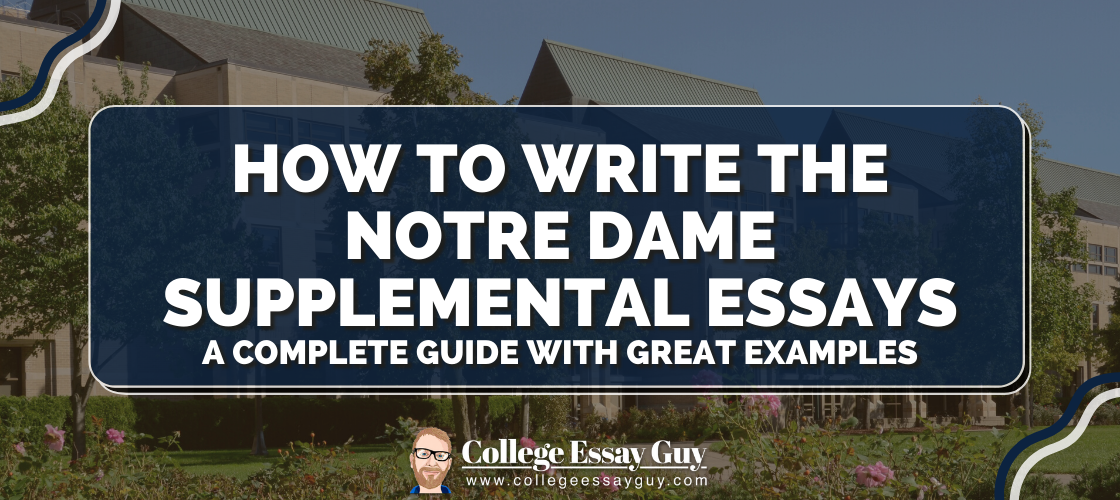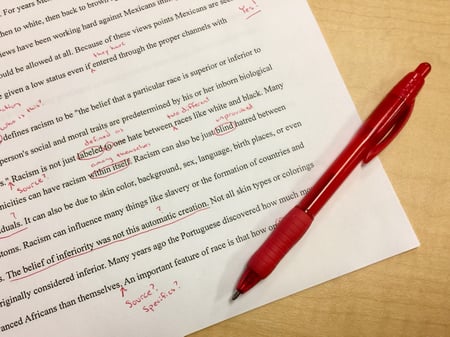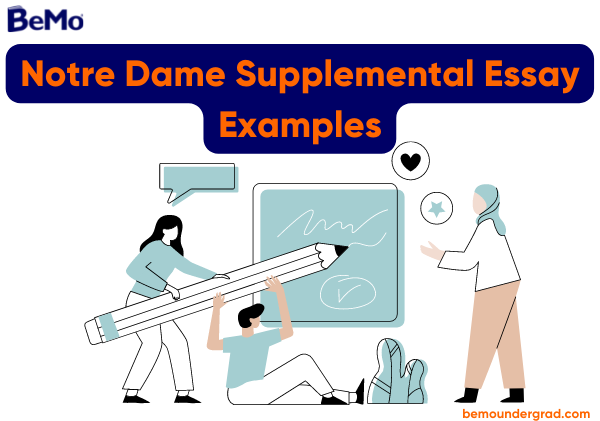How to Write the University of Notre Dame Supplemental Essays: Examples + Guide 2023/2024


TABLE OF CONTENTS
What are the notre dame supplemental essay prompts.
- How to write each prompt for Notre Dame
- Prompt #1: Multiple options (choose 2)
- Option 1: "Service / Community" essay
- Option 2: "Diversity" essay
- Option 3: "Advocacy" essay
- Prompt #2: Short answers (choose 3)
- Option 1: "Why us?" essay
- Option 2: "Joy" essay
- Option 4: "Why major?" essay
- Option 5: "Faith" essay
Notre Dame gives you a few options to choose from to help them see more of who you are and what you bring to the college campus.
But before you dive right into the prompts, get an extensive, by-the-numbers look at Notre Dame’s offerings in its Common Data Set , and for deeper insights into how the university wants to grow and evolve, read its strategic plan .
The University of Notre Dame Writing Section consists of responses to two (2) brief essay questions and three (3) short-answer responses to questions you select from the options provided.
Notre Dame University Supplemental Essay Prompt #1
Please choose two questions from the options below. Your brief essay response to each question should be no more than 150 words. Notre Dame fosters an undergraduate experience dedicated to the intellectual, moral, and spiritual development of each individual, characterized by a collective sense of care for every person. How do you foster service to others in your community? What is distinctive about your personal experiences and development (eg, family support, culture, disability, personal background, community, etc)? Why are these experiences important to you and how will you enrich the Notre Dame community? Describe a time when you advocated for something you believed in and influenced others through thoughtful discourse to promote a deeper understanding of a difficult situation.
Notre Dame University Supplemental Essay Prompt #2
Please choose three questions from the options below. Your response to each short-answer question should be no more than 50 words. Everyone has different priorities when considering their higher education options and building their college or university list. Tell us about your “non-negotiable” factor(s) when searching for your future college home. What brings you joy? What is worth fighting for? What is something that genuinely interests you, and how does this tie to the academic area you hope to study at Notre Dame? How does faith influence the decisions you make?
How to Write Each Supplemental Essay Prompt for University of Notre Dame
How to write notre dame supplemental essay prompt #1.
Please choose two questions from the options below. Your brief essay response to each question should be no more than 150 words.
- Notre Dame fosters an undergraduate experience dedicated to the intellectual, moral, and spiritual development of each individual, characterized by a collective sense of care for every person. How do you foster service to others in your community?
- What is distinctive about your personal experiences and development (eg, family support, culture, disability, personal background, community, etc)? Why are these experiences important to you and how will you enrich the Notre Dame community?
- Describe a time when you advocated for something you believed in and influenced others through thoughtful discourse to promote a deeper understanding of a difficult situation.
Option 1: Service / Community essay
Notre Dame fosters an undergraduate experience dedicated to the intellectual, moral, and spiritual development of each individual, characterized by a collective sense of care for every person. How do you foster service to others in your community? (150 words)
Two questions to ask yourself as you brainstorm topics for this prompt:
What sort of service and civic engagement projects have you been involved with? Your Activities List is a good place to start.
Are there any essays you’re already writing for another school that you could double with this prompt? If so, it may be a candidate for a Super Essay .
Do you have meaningful examples and anecdotes that show how you have been of service and how you’ve fostered service in others—like the club you started to teach chess to fifth-graders, or the recycling project you led in your neighborhood, or the comedy skits you put on for the local senior center? Your topic of choice should be something you genuinely care about. You’ll find it much easier to write with enthusiasm if you talk about something you actually find important and interesting.
Once you’ve picked a topic, you’ll notice you’re (probably) writing an extracurricular activity essay. Here’s a complete guide on how to write that. You’ll want to make sure your values are super clear by the end of the essay.
Finally, you have the option to weave in how you’ll continue this work (or continue to explore these values) at Notre Dame. If so, consider connecting your goals with unique resources at the university. Read this “Why us?” essay guide for tips and examples. This might make up just the end of your essay.
Below is an example of a super essay approach—the student used this essay for many different school prompts, including Georgia Tech, but it could work well for Notre Dame with some small tweaks.
If there were a “cry graph” for the number of times students at my school broke down from freshman to junior year, it would increase exponentially. We often found ourselves weeping together in philosophy class, one of the only safe spaces to open up emotionally about the stress we all experienced. The phrase “I’m going to kill myself” became so popular that it was difficult to walk from one end of a hallway to the other without hearing it, and my closest friend confessed that she considered quitting school to escape the asphyxiating stress. These red flags led me to decide that it was time to change the picture of the cry graph and create a space outside of philosophy class where we could support each other, so I founded the Psychology and Mental Health Club. Knowing how tough our second semester of junior year would be, I organized the first Psych Club meeting with a sense of urgency. We designed a survey to gauge the stress levels of students and to identify the most common sources. Then, I researched empirically proven de-stressing methods, and found that yoga, art therapy, and canine therapy can lower blood pressure and cortisol levels while increasing oxytocin levels. I organized stretching and doodle sessions, and collaborated with the library to host therapy dogs so that students could ‘paws’ and relax. After each event, we asked students to indicate their stress levels before and after; 96% of students responded that their stress decreased. I am elated to say that the Psych Club seems to have successfully reversed the ‘cry graph.’ We have received numerous requests to continue and expand our work, so we plan to hold our sessions every two weeks, and to introduce meditation, calming music, herbal teas, and other mindfulness activities that I continue to explore. (300 words) — — —
Tips + Analysis
Consider starting with an engaging hook. The author here does a great job of drawing readers in with her first line. She sets up a problem and explains it in an unconventional way. She does this by telling us that a great proportion of students at her high school face significant mental health challenges through the idea of a “cry graph.” Mental health is something that a lot of students might choose to write on for this prompt, so it could be hard to stand out, but the way this applicant approaches the topic feels fresh and unique. It’s odd to think about something like crying being graphed like a mathematical equation, but it’s also intriguing, and that makes us want to keep reading. Use your hook to show your mind working in unconventional ways, and perhaps introduce a dilemma that you can resolve as your piece progresses. This both raises the stakes for readers and piques their curiosity about you.
Make sure the purpose of each paragraph is clear and different from the previous one. This essay is divided into three paragraphs. They each build on one another and push the narrative forward. The first sets up the problem through the eyes of the writer and briefly alludes to her proposed solution: she noticed how severe a problem mental health was at her school, so she founded the Psych Club. The second paragraph expands upon the author’s self-created solution and we get great specific details about what she did to change the culture of the school. The last paragraph is a bit more introspective and reflects upon what the author hopes to accomplish in the future now that the club has proven itself to be a success.
This structural division of these ideas and elements of the larger story helps us process what’s going on more effectively. If this was just one big dense block of text, we might find ourselves bored or tired of reading. We might also be a bit confused as to what the key takeaways are. Use the structure of your essay to amplify the content and maintain your reader’s attention.
Quantify or qualify impact. Impact can come in a lot of different forms. You can recount personal anecdotes or reflections. You can talk about statistics and numbers. You could even relive specific emotions or tap into visceral senses to convey the magnitude of a moment or event. In this case, the author uses numbers, telling us that an impressive 96% of her classmates reported feeling better after her club was formed. Why is it important that she included this number? Well, while all the activities the club planned sound incredible and the problem at hand seems like an important one, impact grounds ambiguity in reality. We don’t want to be left guessing about the effect of this narrative. Impact gives the piece a sense of purpose and helps us better understand how this applicant has concretely contributed to her community. The more you can do to convey impact and highlight the real life implications of your topic, the better.
How do you foster? Because the example above was written for a different school’s prompt, it doesn’t directly address the How do you foster service to others in your community? phrasing of the Notre Dame prompt as directly as it could, depending on your interpretation: “Foster service” could just refer to how you have served others, but it could also be interpreted to mean how you’ve influenced others to be in service to community. We’re not positive which interpretation Notre Dame intends here, but it may help your essay if you include specific details that clarify how you’ve encouraged others to be of service through your actions.
Option 2: Diversity essay
What is distinctive about your personal experiences and development (eg, family support, culture, disability, personal background, community, etc)? Why are these experiences important to you and how will you enrich the Notre Dame community? (150 words)
This is a fairly standard “how will you contribute” prompt.
Essentially, a way to think of this kind of prompt is that it’s a combo of “community/identity/background” and “why us” prompts: use some of your response to show how you’ve become who you are, and then show how those experiences shape what you will bring to the college through linking to specific opportunities/groups/details. Connect your unique upbringing, in a very broad sense of the word, with what the school offers and how you will make a great team.
While there are many things outside of “community” that might fit this prompt, if you’re looking for a way to brainstorm ideas, that’s a good place to start. (But keep in mind that you’ll want to include some “how will you contribute” details in your essay—this isn’t just a “tell us about a community” prompt.)
For a full guide to “community” essays , head there, but here’s the short version, plus how to add “how will you contribute” elements:
STEP 1: DECIDE WHAT COMMUNITY YOU WANT TO WRITE ABOUT
Create a “communities” chart by listing all the communities you’re a part of. Keep in mind that communities can be defined by...
Place: groups of people who live/work/play near one another
Action: groups of people who create change in the world by building, doing, or solving something together (Examples: Black Lives Matter, Girls Who Code, March for Our Lives)
Interest: groups of people coming together based on shared interest, experience, or expertise
Circumstance: groups of people brought together either by chance or external events/situations
STEP 2: USE THE BEABIES EXERCISE TO GENERATE YOUR ESSAY CONTENT
You’ll find detail on the BEABIES Exercise + a chart you can use at that link.
STEP 3: DO SOME “HOW WILL YOU CONTRIBUTE” RESEARCH
You’ll want to offer a few specific ways that show how the experience/s you’re discussing in your essay will allow you to contribute to the college. The easiest way to do this is to do some “Why Us”-like research and find ways you’ll engage with and contribute to the school’s community.
STEP 4: PICK A STRUCTURE (NARRATIVE OR MONTAGE)
Step 5: write a first draft.
Here’s an example essay written for Columbia but that illustrates how to approach this kind of prompt:
At family dinners over gnocchi and arancini, my grandpa would always ask my two older brothers how their education and sports were going. I’d wait for my turn, but the question was never directed my way. In contrast, my grandma always tells me how thankful she is that I’m able to get an education of my own. She frequently mentions how she regrets never getting an education. I pursue my education with a fire within me to do what she wasn’t allowed to. During the summer of 2021, I realized that I could impact other girls in a similar way by writing a children’s book about influential women in STEM in order to inspire the next generation of female scientists. At Columbia University, I hope to contribute to the empowerment of women by creating a Society of Women in Science, hosting Alumni Panels, Graduate Student Q&A’s, and creating a safe space for women in similar majors to discuss their successes and setbacks. In addition, joining the Student Wellness Project will provide another community that prioritizes mental health. This empowering environment is the ideal place to help me develop as both a feminist and a scientist. — — —
Tips + Analysis:
View the prompt broadly. While this prompt offers you the perfect opportunity to explore the impact race, socioeconomic status, and other societal factors have had on you, don’t feel overwhelmed by the magnitude of the prompt. As in the example above, where the student recounts her experiences with a cultural and generational divide, there are many experiences we’ve had that have shaped who we are. Some are deep, like being the only person of color at your high school, while others are more light-hearted, like having to learn to make your own grilled cheese at age 8 as a latchkey kid. Both are admirable in their own ways. Both may be really important to you. And both can make really effective responses.
Make campus connections. The second part of the prompt is as important as the first. While the college wants to hear about your past experiences, they’re just as curious about how they’ll shape your time on campus, leaving the school better than as you found it. But remember, they probably want at least some (if not all) focus on outside-the-classroom experiences here, so dive into their list of student organizations and find a few that truly resonate with you and that you feel you could make a meaningful contribution to. The student above does just that with their reference to the Student Wellness project and how they expect to contribute.
Be a changemaker. Can’t find an organization at Notre Dame you'd like to join? Create your own! The student in the example above plans to start their own organization and even outlines some of the specific events she plans to hold. It's clear she's done her research to see where the college might be lacking in female-centered organizations—and she's going to take the charge to correct that.
Tie the two together. Make sure your past connects with your future. That means tying the lessons from your childhood, preteen, and adolescent years with the contributions you're going to make on campus. The response above does a great job in doing that. As a young female who has, from a young age, been committed to empowering young women, it’s clear how this student is going to make a specific impact on the college’s campus community.
And here’s another example, written for Williams’ version of this prompt:
In the 1930s, 36 members of my family were lost to the Holocaust, and that fact has since led me to carry on the memory of my ancestors through tradition—preparing for my Bar Mitzvah, observing Jewish holidays, and going to synagogue for Rosh Hashana. Additionally, it has driven me to teach others about the Holocaust. At my first-year Entry, I would share my involvement within the Jewish community, and how it has led me to become a more engaged member of society. During this past school year, I became an educator on the Student Leadership Board of the Seattle-based Holocaust Center for Humanity. Meeting biweekly, we discussed historical anti-Semitism as well as modern-day discrimination toward oppressed groups of people. Before joining the board, I had felt disconnected from Jewish activism and lacked a community of fellow Jewish activists. My year on the board solved that. Each week, I added my ideas and learned from fellow students during group discussion. Additionally, I built an interactive website to share the story of a Holocaust survivor. Even though we weren’t all Jewish, this group’s drive for educating others and spreading peace brought us closer. It was a community where we could talk about serious current events, but also where we could share a laugh. At Williams, I hope to discover that same kind of community. I’ll join the Williams College Jewish Association, where I can carry on what I loved about the Holocaust Center’s board, participating in discussions, leading service projects, and making impactful art to share stories. Even outside that group, I’ll bring to Williams my Jewish values and enthusiasm for meeting people from different backgrounds, spreading a greater message of peace and kindness. (282 words) — — —
Option 3: Advocacy essay
Describe a time when you advocated for something you believed in and influenced others through thoughtful discourse to promote a deeper understanding of a difficult situation. (150 words)
Part—and really, a big part—of the college experience is being exposed to new people, perspectives, and ’periences (and, perhaps, playing with creative alliteration). This prompt offers you a chance to show how you can engage in productive dialogue around complex issues.
A few things to keep in mind as you brainstorm possible topics for this prompt:
Don’t think you have to write about a knee-jerk issue and a blow-up here. You can. But the point of this prompt is essentially to help a college see the kind of student you will be in a classroom—can you engage with people who disagree with you in ways that lead to productive discussions rather than just shouting or conflict. (See Tips below for more on this.)
Focus more on the engagement, change, and growth than on the conflict. How you engaged on the issue, what you learned, and how you grew are far more important to your readers here than the conflict itself. You can plan on spending fairly little word count on the conflict/topic, so that you can spend most of your time exploring some deeper whys.
This is a new prompt for Notre Dame, so we don’t have any examples specific to this school. But this essay, written for Princeton, offers a clear example of how you can approach this prompt.
I probably argue with my grandfather more than I do with most other people combined. It’s not because we’re at odds. We just have different perspectives, influenced by our experiences—his as a life-long resident of India, mine as a first-generation American. One pretty common argument we have is over Eastern vs. Western medicine. My solution to a headache, for example, is to take Advil. His is to rub Tiger Balm on his forehead and coconut oil on the soles of his feet. I try to convince him of the benefits of taking a nonsteroidal anti-inflammatory, describing how it can reduce inflammation by blocking the production of certain chemicals. He tries to convince me that the balm creates a cooling effect, distracting the brain from pain and relaxing the muscles. Rather than becoming sore at or resentful of each other, we’ve grown closer through these debates, and I’ve learned how to disagree without letting the situation get acrimonious. Through these interactions, I’ve learned that a discussion shouldn’t be confrontational. The purpose isn’t to win, but to share my knowledge with the other party and learn from them as well. So rather than saying, “Rubbing balm on your forehead is stupid; you should just take Advil,” I say, “While rubbing balm on your forehead seems to work, I’ve noticed that taking an Advil has a stronger and more immediate effect.” Respecting the opposing party makes them more willing to hear you out. I’ve also learned there’s a fine line between logic and emotion. I try not to take personally the things my grandfather says in an argument. Just because he doesn’t think taking Advil is the better solution doesn’t mean he thinks I’m stupid. If I take it that way, we begin to move away from what the argument really was about—the facts. I’ll continue to apply these learnings in discussions and debates I have with others, realizing that having a “successful argument” isn’t about winning. It’s about sharing my opinion and learning from theirs, expanding our perspectives without alienating each other. (340 words) — — —
The conversation topic can be anything. You might assume that for your essay to be attention-grabbing, you need to pick a “hot topic” like a recent SCOTUS decision or climate change. And those topics are fine, if they’re really reflective of who you are. But smaller discussions can be just as lively … just as relevant … and just as revealing. This student does a great job at finding a unique cultural difference—Tiger Balm vs. Advil—and showing how he’s used that as a springboard to finesse his art of debate and understanding.
Show your stance. One common fear with these “differing opinion” supplemental essays is that the admissions officer reading it may not agree with your stance or belief. This is actually not the point of these essays. Many colleges have opted to ask this question because of widespread public concern around free speech on college campuses , and requests from their college leadership (such as the Board of Trustees) to identify students who are willing to listen to multiple viewpoints. Given this, a student’s response is generally more powerful when they specifically clarify that their own position is, rather than sticking to vague terminology so that the reader will see them as “neutral.” Otherwise, you run the risk of coming off as apathetic or indifferent, which lessens the meaning and significance of your example. Here, this student gives specific examples of their support for Western medicine. Sure, it’s not the most controversial opinion, but again, that’s not necessarily the goal! You can choose any opinion, so long as it demonstrates your values and beliefs and a change in how you approach dialogue.
Be willing to be wrong. We can learn as much from our failures as we do from our successes. In fact, sometimes, it says more about us when we’re willing to be vulnerable enough to admit we’re wrong—or, at least, not entirely right. This student echoes that point, acknowledging it “isn’t about winning.” Instead, having viewpoints that are different from those he respects and admires helped him learn about balancing logic and emotion as well as practice the art of listening.
Unveil your “software update.” You know when your phone annoyingly lets you know that you have to install a critical software update to use your favorite app (and you’re like… ugh, bruh, it was working fine before)? Well, in this case, the admissions officer is actually actively craving that update notification. They want to know specifically how your approach has changed when navigating differing opinions. This student does exactly that by using actual quotations: “So rather than saying, ‘Rubbing balm on your forehead is stupid; you should just take Advil,’ I say, ‘While rubbing balm on your forehead seems to work, I’ve noticed that taking an Advil has a stronger and more immediate effect.’” The “2.0” version of this student is more advanced, more sophisticated, and more willing to tackle complex “bugs”—without corrupting someone else’s data. Whether you quote yourself or not, be sure to use this essay as a chance to unveil “You 2.0” to colleges.
how to write Notre Dame Supplemental Essay Prompt #2
- Everyone has different priorities when considering their higher education options and building their college or university list. Tell us about your “non-negotiable” factor(s) when searching for your future college home.
- What brings you joy?
- What is worth fighting for?
- What is something that genuinely interests you, and how does this tie to the academic area you hope to study at Notre Dame?
- How does faith influence the decisions you make?
Short Answer option 1: "Why us?" essay
Everyone has different priorities when considering their higher education options and building their college or university list. Tell us about your “non-negotiable” factor(s) when searching for your future college home. (50 words)
These are your classic short answer questions that several colleges require.
Here’s a larger guide to questions like these.
And here are some general tips to get you started on the short-answer portion of the Notre Dame application:
Think of your short answers as an advent calendar. Consider that each of your short answers, no matter how short, is a tiny window into your soul. Make sure the reader finds something inside that's awesome and different from the window before.
Use all or most of the space allotted to explain your answer. You’re given space for 50 words for an answer that could easily be one or two words. So use it up! In other words, you can answer "why," even if the prompt doesn't ask you to. Do this because your core values may be hard to express in 1-2 words.
Get specific. Don’t just give a generic answer followed by a generic reason for your generic answer. Be creative and use details that give you a distinctive/memorable voice.
Feel free to take (calculated) risks on these. Get creative. Push boundaries (a little). To clarify, we don’t mean shock for the sake of shock value; make sure you’re still revealing core values (one of which might be humor, for instance). Speaking of which ...
Don't check your humor at the door. If you're funny in life, feel free to be funny in your short answers. If you're not funny, no need to start now. ;)
Offer a variety of things you're interested in. If you love science and wrote a supplemental essay about science, don't answer prompt #2 with 20 journals, websites, or publications you’ve read on ... science. Show how you find joy in astrophysics but also literature, philosophy, Star Trek, programming, and Godfather 1 and 2 (but not 3.)
Note that there isn’t, like, some magical key/code with these where, if you answer the right thing for your favorite website, then the door to the college will be magically opened to you (sure, that would be nice, but no, not how this works). These are just a chance (well, three chances) for the school to get to know you better. So make the most of them by sharing values and insights, but don’t over-obsess as though your life depends on them. ‘Cuz it doesn’t.
To illustrate how you can approach these, here are some examples for some of the prompts above:
Short Answer option 2: "Joy" essay
What brings you joy? (50 words)
Essay examples:
Genuine personal interaction brings me joy. I’d rather grab a burger with friends than go to a raging house party. My perfect night is spending time with friends engaging in absurd “philosophical” conversations or creating pastimes, like sky-pong (ping-pong… but you hit the ball off the ceiling versus the table). — — — A warm meal with family lets me connect with my Romanian heritage through traditional dishes and desserts, and with my brothers, my first and closest friends. And biking down a steep hill after having cycled all the way to the top is a transient yet exhilarating reward for my labors. — — — Cardmaking is a mixture of precision and artistry, a blend that brings me joy. It combines creative calligraphy and colorful cardstock. I smile at the reaction of a music-loving friend on her birthday as she notices that I used sheet music to create the base of her card. — — — Every November 1st, my family starts on Christmas Lego: first the new set, then ones from past years. It takes until the week before Christmas to complete the sprawling brick village across the dining room sideboard. Nothing gets me more in the Christmas spirit (and I really love Christmas). — — — Humming, singing, and belting. Or a combination of the three. Regardless of how I am doing, these activities never fail to make me feel ten times better, whether that be because I am performing, or just because I am screaming in my room. — — — Finding a manatee mother with her baby on Banana River, open gym volleyball, sunny but cool California weather, when my coding works the way I want, creating funnily-shaped breads with my sister Amy, aroma of cinnamon tea wafting from my cart as I pass out tea to the nurses station — — — Six-word stories; poems by Jorge Luis Borges; the state of peace from doing yoga; immersing myself in history fictions before bed; Friends; holding my mom’s hand on our walks; the breathtaking sunset of Mount Hermon; talking and laughing across from a dear friend selfishly wishing the moment could last forever. — — —
Short Answer option 3: "Advocacy" essay
What is worth fighting for? (50 words)
Visiting relatives in India, I noticed the real inequity in world healthcare. The United States spends over $10,000 per person on healthcare annually, whereas India spends less than $100 per person. Access to proper healthcare should be a basic human right and not based upon a country’s development. — — — Society’s disproportionate focus on beauty often prevents girls from achieving their true potential. Until we begin measuring womens’ worth by their talents and innate values instead of their looks, I worry that girls who don’t fit conventional standards of weight and beauty will be held back from pursuing their dreams. — — — America’s prison system forces anyone with jail time, even nonviolent offenders, to be labeled as less than human by society—felons are denied many rights, including the right to vote. The prison system needs to be overhauled, starting with decriminalizing nonviolent offenses, such as marijuana possession. — — — At my school, there isn’t much emphasis on community enrichment and discussion. “I’m not affected, so why is mental health my problem?” “I can’t vote, so why should I discuss gun rights?” By prioritizing civic engagement, we can encourage genuine discourse, preventing the widespread complacency that exacerbates societal issues. — — —
Short Answer option 4: "Why major?" essay
What is something that genuinely interests you, and how does this tie to the academic area you hope to study at Notre Dame? (50 words)
Think of this as a super short “Why Major” prompt (with an option for a “ Why Us? ” detail at the end). Because it’s so short, you’ll want to be judicious with your word budget to clearly articulate both the what (the field of study you’re interested in) and the why (where your interests come from).
To get you started, here’s a complete guide to the “Why Major'' essay . Below is a condensed version.
One possible approach:
Think of this as a quick origin story.
Step #1: Imagine a mini-movie of the moments that led you to your interest and create a simple, bullet-point outline.
Step #2: Put your moments (aka the “scenes” of your mini-movie) in chronological order, as it’ll help you see how your interests developed. It also makes it easier to write transitions.
Step #3: You’ll likely want to include a specific thesis that explicitly states your central argument—in this case, what you want to study and why. This thesis can come at the beginning, middle, or end of your essay.
Once you have those pieces, you have a few structural options:
A. A quick hook that thematically sets up where you’ll take us, and, ideally, shows an aspect of your intellect/personality (If you do this, it can be stylistically effective to bookend—to end the essay by linking back to what you opened with.)
B. An initial moment that sparked your interest
C. Your thesis
Body (but to clarify, this essay can be a single paragraph if you choose)
The moments of your mini-movie, illustrating both the development of your interest and some of your core values
One option: Go narrower—perhaps link to specific aspects of the college that will help you continue on your path toward a future goal.
Another option: Go wider—name the road you hope to follow (for example, career path, organizations you’d like to work with, the greater value/implications of studying what you want to).
Because Notre Dame’s word count is so short, you’ll likely only have space for 2-3 sentences here, covering the areas above.
And last, a quick tip: Be sure this essay is consistent with your personal statement if you’ve mentioned aspects of your major/career there.
Here’s a nice example essay written for Yale’s “Why Major” prompt (and thus double Notre Dame’s word count limit), but can give you a nice sense of the direction to head with your content:
Storytelling has shaped me. At four, I read The Lion King until I’d memorized it. I’d snuggle in bed as my dad read Wilderness Champion or Tom Sawyer. Later, I found audio and visual storytelling, mesmerized by This American Life and Whiplash. Now, I create my own stories through newspaper satire, podcasting, and locally-broadcasted radio. My major at Yale would be the next chapter in my life of storytelling. I’d explore past narratives and how they can be digitally innovated. Whether exploring media’s disfiguration of truth, developing screenplays, or analyzing mise-en-scene, I hope to pioneer new networks of connection. (99 words) — — —
(Quickly) hook the reader. The first line performs a few functions here. First, it pulls us in and makes us curious about what exactly she means by claiming that storytelling has shaped her. Second, it gives us a sense of a core aspect of her identity and values.
Show the development of your interest through moments that connect to core values. She packs a nice amount of detail into 99 words. The details she includes point toward her values and identity, as do her interests in newspaper satire, podcasting, and local radio. The details in the second paragraph show some nice depth and development.
Describe how Notre Dame can help with the next steps. This author links her brief origin story to how the college can help her on her path, and how it will help her develop both her understanding and her values.
Short Answer option 5: "Faith" essay
How does faith influence the decisions you make? (50 words)
Essay example:
For the past couple of months, I’ve chosen each day to perform a mitzvah (a good deed). Whether through planning for a Cookies for Cancer bake sale and donating the proceeds, or driving a friend home after school, I am constantly seeking to achieve the most selfless version of me, an idea that my religion consistently promotes. — — —
Special thanks to Tom for writing this blog post.

Tom Campbell (he/him) is an eternally extra Gemini who has spent the past seven years helping students and families navigate the college admissions process—one alliterative/assonant aphorism at a time. Prior to joining College Essay Guy, he worked as a college counselor at Lakeside School and an admissions officer at Pomona College and College of the Holy Cross (his alma mater). He stans em dashes and semicolons, Kacey Musgraves (all eras, not just star crossed and Golden Hour), superior breakfast burritos, and complaining about space tourism.
Top Values: Authenticity | Fun | Vulnerability


Choose Your Test
Sat / act prep online guides and tips, 4 tips for writing amazing notre dame essays.
College Essays

The University of Notre Dame is one of the most prestigious universities in the United States. It attracts the best and brightest students from around the country, and its acceptance rate shows that. For the 2021-2022 school year, they admitted only 15% of applicants . Because most applicants have amazing grades and transcripts, your Notre Dame application essays will be one of the most important ways for you to stand out from the crowd!
This guide will walk you through everything you need to know about writing Notre Dame's application essays. First, we'll give you an overview of the Notre Dame supplement. Then we'll walk you through each essay individually and answer the following questions:
- What is the essay asking you to do?
- What makes for a good answer?
- What are some potential essay topics?
- Are there pitfalls you should avoid?
And finally, we'll give you four top tips for taking your Notre Dame essays to the next level. So let's get started!
Why Are the Notre Dame Application Essays Important?
The hard truth is that getting into Notre Dame is tough. Only 15% of applicants in 2020/2021 were accepted, which makes Notre Dame even harder to get into than schools like Georgia Tech and Vassar !
And because Notre Dame attracts top talent, admitted students also boast excellent standardized test scores. In fact, the average Notre Dame student scored between a 1460–1540 on their SAT or a 33–35 on their ACT.
So what kind of applicants get admitted? According to the Notre Dame Office of Undergraduate Admissions , Notre Dame is looking for well-rounded, passionate students who excel in the classroom and are involved in the community. Here's how Notre Dame sums up the importance of the essay portion of your application:
"The writing supplement gives us an opportunity to get to know you in a more personal way outside of your stats. So, let your personality shine, take risks, and remember that there is no right answer."
In other words, admissions counselors want to know the real you. These essays are your chance to show admissions counselors that you're the whole package, especially since Notre Dame does not conduct admissions interviews.
That means your essay responses will be one of your only opportunities to show admissions counselors that you're an excellent fit for their university .
Let's take a closer look at the Notre Dame supplement, which you'll have to fill out as part of your overall application.
An Overview of the Notre Dame Supplement
The Notre Dame supplement is available through either the Common App or the Coalition App websites. The Common App and the Coalition App are online platforms that let you apply to multiple colleges at once. If you aren't sure what they are or how to use them, check out our guides to filling out the Common App and the Coalition App , which include tips for tackling the personal essays!
Here's where things get a little bit tricky: the Notre Dame supplement is submitted in addition to the application you have already filled out. That means you will be submitting additional essays specific to Notre Dame on top of the essays you've written for your universal application package. That's why it's called the Notre Dame supplement!
The 2 Parts of the Notre Dame Writing Supplement
The supplement itself asks you to write and submit two additional essays, which are split into two groups:
- First, there's the mandatory essay . This is the prompt that everyone who applies to Notre Dame must answer.
- For your other essay, you're given a choice between four prompts and must answer one.
The online portals give you a maximum of 200 words to respond to each prompt. That's not very much space! But remember: your admissions essays are about quality, not quantity.
Now that you have a general sense of the Notre Dame supplement, let's take a closer look at each essay topic.

Essay 1: "Why Notre Dame?"
Notre Dame is a Catholic university, founded by members of the Congregation of Holy Cross, with a mission to educate the hearts and minds of students. What excites you about attending Notre Dame?
Remember: this essay topic is mandatory, which means you must answer it to complete the supplement. But don't worry...we're going to walk you through the process!
What Is the Essay Asking You to Do?
This prompt is essentially the "Why This College?" question. This is a common supplemental essay question designed to help admissions counselors understand why Notre Dame—and literally no other university!—is the perfect school for you. The "Why Notre Dame" prompt also serves another purpose: it helps them get a sense of how you, as both a student and as a person, will contribute to the Notre Dame community.
Y our job is to show admissions counselors that you're the perfect fit for Notre Dame, and vise versa.
What Makes for a Good Answer?
If you want to knock this essay out of the park, here's what you should do.
#1: Do your homework.
The key to writing an amazing "Why Notre Dame?" essay is showing admissions counselors that you've really dug into the resources and opportunities available at the school. Doing this proves you're more than interested—it shows you're passionate and motivated, too.
As you research, look at specific classes you might be interested in taking and/or professors you might want to research under. ( Here's a list of all the colleges and departments at Notre Dame to get you started !) For example, if you want to program the next Alexa, you'll want to mention taking classes like Artificial Intelligence and Software Development Practices. Or if curing cancer is more your thing, you can mention working with Dr. Jessica Brown , who is researching RNA to better understand how cancer works.
#2: Not sure what you want to major in yet? No problem.
This is a common question we get when it comes to the "Why This College?" essay. The simple answer is: it's okay to not know! Admissions counselors know that your major isn't set in stone, but they do want to see that you're thinking about the future. Even if you're not 100% certain about what you want to do in the future, pick a potential academic field for the sake of writing this prompt.
#3: Plan to address the "mind" and the "heart."
You probably already noticed that the application prompt very specifically mentions two concepts: the "mind" and the "heart." Notre Dame is a religiously affiliated institution, and while they don't require all students to be religious, part of their core mission is to foster "the development...of those disciplined habits of mind, body, and spirit."
So in your response, you need to make sure you're doing more than just talking about how Notre Dame will shape you academically. Admissions counselors also want to see how the school will shape you as a person. You'll have to address both of these things in order to accurately answer the prompt!
#4: Don't overlook the Notre Dame community, either.
The prompt specifically asks you about how the Notre Dame experience will impact you, which means admissions counselors want to know more about how you'll fit into the Notre Dame community.
For instance, if you were in theatre in high school, you might want to participate in Shakespeare at Notre Dame ! Also, many departments have their own student organizations (like the American Studies Club or Beta Gamma Sigma , a business honors society). Make sure you check departmental pages for this information.
One quick note about religion: Notre Dame is a Catholic university, so many of i ts community programs are religiously affiliated . Unless you're serious about becoming a member of one of these groups, don't mention it in your essay. Admissions counselors read thousands of applications every year, and they will know if you're being sincere!
#5: Start narrowing things down.
Now that you've done your research and have a list of classes, professors, programs, and extracurriculars, choose the two or three things that stand out most. You only have 200 words, so you need to give yourself space to talk about the items you've chosen!
#6: Relate your topics to your goals .
Remember, your job is to show admissions counselors that Notre Dame is the only school for you. Explain how the classes, programs, and activities you've mentioned will put you on the path to achieve your goals while growing as a person.
For example, if you want to study adolescent psychology, explain how your coursework and experience at Notre Dame will help you go on to research how social media affects adolescents' brain development. By making it personal, you'll be able to emphasize how Notre Dame is the only place that can set you on the path to success.
What Are Some Potential Essay Topics?
Along with the examples we mention earlier in this section, here are a few other topics you might consider for this essay:
- Talk about how you hope to contribute to a specific ongoing research project with professor in your department.
- Explain your future career goals and mention how joining specific campus organizations will help put you on the path to success.
- Discuss how you want to take classes in two departments in order to think about a problem in your future profession in new ways.
Are There Pitfalls You Should Avoid?
Avoid these mistakes so you don't leave the wrong impression with admissions counselors.
#1: Avoid generalities
Make sure you're being as specific as possible about what makes Notre Dame special. Don't just say you're excited to attend because of the school's study abroad programs—most, if not all, major colleges in the United States offer study abroad. What specific programs does Notre Dame offer that you can't find anywhere else?
The same goes for talking about your career interests. Don't say that you want to stop climate change. How do you want to do that? How will specific classes, professors, and research opportunities at Notre Dame help you save the world?
#2: Leave sports out of it
We know, we know: part of the appeal of Notre Dame is joining the legion of Fighting Irish. But unless you're joining one of the athletic teams, focus on academics, career, and service opportunities instead.
#3: Don't sound bored
The question asks about what makes you excited to attend Notre Dame, so let your passion show through in your writing.

Essay 2: Choose Your Prompt
For this section of the Notre Dame essay supplement, you're given three essay prompts, and you'll choose one to answer. Again, you'll have a 200 word limit.
How to Choose Your Prompt
For some people, choosing the prompt is the hardest part! There are a few things you can do to make this easier.
#1: Choose the prompt that lets you share new information
Go through the list and rule out any prompts that you've already discussed as part of your Common App or Coalition App. Some of the Notre Dame supplement essays involve talking about similar topics to the Common App and Coalition App essay prompts. Make sure you choose a Notre Dame essay prompt that lets you talk about something fresh and new!
#2: Brainstorm every prompt
Take an afternoon and write down potential ideas for every prompt below. Don't worry about whether the ideas are good or not—just write them down! Once you're done, take a look at which prompts give you the opportunity to share something new that you haven't already mentioned in your application.
#3: Read ahead
Take a minute to read through the Notre Dame essay example topics below. See if any of the ideas or strategies jump out to you!
Now let's take a closer look at each prompt and how to answer them.
People in the Notre Dame community come from many different places, backgrounds, and walks of life. How is where you’re from a part of who you are?
What Is This Essay Asking You to Do?
The purpose of this essay prompt is to learn more about what makes you who you are. This is your change to (briefly!) show how your background, be it cultural or geographical or anything else, has shaped you into the person you are now. You don't have a lot of room, but try to be as specific as possible.
A major part of this essay is explaining how it relates to who you are as a person, so be sure to choose a topic that you feel will give readers a bit of a better insight into who you are.
What Makes a Good Answer?
#1: Be honest. Don't be tempted to choose a topic that you really don't care that much about but feel will "impress" Notre Dame. It'll result in a weak essay they'll see right through.
#2: Explain why your background is important to you. This probably the most important part of your response since it shows readers what makes you tick.
#3: Give examples. Give specific examples of how your background has shaped you. Do you have certain family or cultural traditions? Places you visit? Holidays? Go into detail!
#1: Lying . As we mentioned above, don't make up an interest to try to impress the admissions team. Faking your background is a very bad idea, and won't help your application. Notre Dame wants to get to know the real you. Show them.
#2: Forgetting to tie it back to yourself. So your town has an annual rubber duckie festival? Great! But how does that relate back to you? Notre Dame didn't ask this question to learn more about your home; they want to know about you!.
Tell us about a time when you advocated for something you believe in.
In this essay, you get the chance to not only show what you believe in, but what you're willing to do in order to defend it. In short, it's a great way to show off your character, something Notre Dame cares a lot about. The causes closest to you offer great insight into who you are and what you value.
#1: Choosing an appropriate topic. You may care very, very much about which order the S tar Wars movies should be viewed in, but try to pick something that shows your character and beliefs.
#2: Reflecting on your actions. Remember to say why you felt compelled to advocate for what you believed in. What were the stakes? What did it mean to you? And how did you feel after?
#1: Spending too long setting the scene. You only have 200 words, so you'll need to establish the setting as quickly as possible.
#2: Being vague. Another major pitfall in answering this question is being too vague and general. For example, stating something like, "After I told the school board we needed to focus more on sustainability in our school and lunch supplies, it felt good" isn't quite enough. Why did you feel good? What else did you feel? And what happened afterward?
If you were given unlimited resources to help solve one problem in your community, what would it be and how would you accomplish it?
This essay prompt asks you to choose something in your community that you want to fix. This works in two parts: first, you get to show what you care about in your community. Are you focused on environmental justice? A specific neighborhood? A school? A group of people?
Second, you get to dream big and solve the problem yourself , which shows off your creativity and dedication.
#1: Explaining the problem. You'll need to begin by describing the problem, and stating clearly why it's so important to you to solve. Why this specific issue? Why does it matter, and what are potential consequences? How would it help your community?
#2: Describing the solution . In order to show how much thought you've given to this problem, you'll need to take care in providing the solution. You have unlimited funds to solve it, but this isn't the time to get goofy. Instead, think forward to the future: make sure your solution isn't a quick fix, but something more long term.
#1: Not taking the prompt seriously. Make sure you choose a real problem in your community. You may personally find it terrible that there's no frozen yogurt place in town, but try to dream a little bigger. Notre Dame takes their prompts fairly seriously, and they want to know what you value.
#2: Being too general. You only have 200 words, but try to get as specific as possible. If you're advocating for a community skate park, for example, say precisely how that will help the area, who will be positively impacted, and what your unlimited funds will go toward.
What is the greatest compliment you have ever been given? Why was it meaningful to you?
This essay prompt wants you to think about how you see yourself, and why . There are many types of compliments you can choose from, but try to choose one that reflects your values. Perhaps someone pointed out your helpfulness, which made you realize how much you value service. Or maybe you were praised for a talent or skill you've worked very hard on.
#1: Sincerity. This is a tricky prompt. It can be really hard to talk yourself up, and that's precisely what they're asking you to do. Be your truest self, and make sure you do a lot of inner reflection about which topic you choose.
#2: The right topic . There are many different types of compliments, and they all feel great! But not all of them will reveal what Notre Dame wants from you. It feels wonderful when someone compliments your eyes, but that could be a little tricky to translate into a short essay.
#1: Humblebragging. It's hard! In a lot of ways, this essay is asking you to brag about how awesome other people think you are. But remember to focus this essay on how you accepted the compliment, and what happened to you internally.
#2: Not reflecting enough. Remember the last part of the prompt: you need to say why this compliment was meaningful to you. Really think about this part. Did it give you confidence that you needed? Did it make you see yourself in a new light? Did it change the way you acted?

4 Tips for Writing a Killer Notre Dame Essay
Follow these four tips to write a great Notre Dame essay that'll show the school who you are and why they want to admit you.
#1: Be Authentic
You're unique, with your own passions, experiences, and beliefs. Admissions counselors want to try to learn more about the "you" behind the transcript, so don't be afraid to let your personality shine through in your essays. Even more importantly, don't try to fabricate stories about yourself that you think will impress the admissions board. We guarantee that there are plenty of compelling things about you! Besides, admissions counselors have a finely tuned lie detector; they'll know if you're making things up.
Admissions counselors look to your essays to learn more about you. That's why it's important to be yourself! Here's what the Notre Dame Admissions website has to say about being authentic: "Your essays are the most enjoyable part of the application reading process. Why? Because we learn about important decisions you've made, adventures you've survived, lessons you've learned, family traditions you've experienced, challenges you've faced, embarrassing moments you've overcome."
#2: Deal With the Religion Question
Not everyone who gets into Notre Dame is religious, but it's important to know that some older demographic surveys show that the student body is up to 85% Catholic . Likewise, institutionally reported data indicates that a student's religious affiliation and/or commitment is considered in the admissions process . So if you are religious and haven't already mentioned that elsewhere, you might consider discussing it in your Notre Dame application essays.
But be careful! Make sure you review Notre Dame's mission and commitments to make sure your answers align with the university's beliefs. Additionally, don't beat a dead horse. Every response shouldn't revolve around religion—Notre Dame is looking for well-rounded students with a variety of interests and passions.
And if you're not religious, don't lie to try and make yourself a more appealing candidate. Like we mentioned earlier, admissions counselors read thousands of applications every year. They'll be able to tell if you're being honest or not.
#3: Jump Right In
Abandon the long-winded introduction! You only have 200 words, so make every one count. To do that, get right into your topic from the very first sentence. If that feels weird, don't worry: you can write a sentence or two of introduction to get you started, then delete it when you start revisions.
#4: Show, Don't Tell
Use descriptive words to paint a picture for your reader. Don't say "I was so nervous to sing in the talent show." Instead, say something like, "My palms were sweaty and I thought I might faint, but I walked on stage and sang anyway." One tells the reader what you did, and the other gives the reader a glimpse at your experience.

What's Next?
Notre Dame is one of the top 20 colleges in the US , so you know admission is competitive. Using an acceptance calculator can help you better understand your chances of getting in .
Notre Dame accepts both the Common App and the Coalition App. Not sure which one you should use? Don't worry: we've got a handy-dandy guide to make your decision a breeze .
Both the Common App and the Coalition App require additional essays beyond the ones we discussed in this post. (Yep, that means even more writing! Yay!) Thankfully, we have in-depth guides for both the Common App essays and the Coalition App essays .

Want to write the perfect college application essay? Get professional help from PrepScholar.
Your dedicated PrepScholar Admissions counselor will craft your perfect college essay, from the ground up. We'll learn your background and interests, brainstorm essay topics, and walk you through the essay drafting process, step-by-step. At the end, you'll have a unique essay that you'll proudly submit to your top choice colleges.
Don't leave your college application to chance. Find out more about PrepScholar Admissions now :

Ashley Sufflé Robinson has a Ph.D. in 19th Century English Literature. As a content writer for PrepScholar, Ashley is passionate about giving college-bound students the in-depth information they need to get into the school of their dreams.
Student and Parent Forum
Our new student and parent forum, at ExpertHub.PrepScholar.com , allow you to interact with your peers and the PrepScholar staff. See how other students and parents are navigating high school, college, and the college admissions process. Ask questions; get answers.

Ask a Question Below
Have any questions about this article or other topics? Ask below and we'll reply!
Improve With Our Famous Guides
- For All Students
The 5 Strategies You Must Be Using to Improve 160+ SAT Points
How to Get a Perfect 1600, by a Perfect Scorer
Series: How to Get 800 on Each SAT Section:
Score 800 on SAT Math
Score 800 on SAT Reading
Score 800 on SAT Writing
Series: How to Get to 600 on Each SAT Section:
Score 600 on SAT Math
Score 600 on SAT Reading
Score 600 on SAT Writing
Free Complete Official SAT Practice Tests
What SAT Target Score Should You Be Aiming For?
15 Strategies to Improve Your SAT Essay
The 5 Strategies You Must Be Using to Improve 4+ ACT Points
How to Get a Perfect 36 ACT, by a Perfect Scorer
Series: How to Get 36 on Each ACT Section:
36 on ACT English
36 on ACT Math
36 on ACT Reading
36 on ACT Science
Series: How to Get to 24 on Each ACT Section:
24 on ACT English
24 on ACT Math
24 on ACT Reading
24 on ACT Science
What ACT target score should you be aiming for?
ACT Vocabulary You Must Know
ACT Writing: 15 Tips to Raise Your Essay Score
How to Get Into Harvard and the Ivy League
How to Get a Perfect 4.0 GPA
How to Write an Amazing College Essay
What Exactly Are Colleges Looking For?
Is the ACT easier than the SAT? A Comprehensive Guide
Should you retake your SAT or ACT?
When should you take the SAT or ACT?
Stay Informed
Get the latest articles and test prep tips!
Looking for Graduate School Test Prep?
Check out our top-rated graduate blogs here:
GRE Online Prep Blog
GMAT Online Prep Blog
TOEFL Online Prep Blog
Holly R. "I am absolutely overjoyed and cannot thank you enough for helping me!”
The Ivy Coach Daily
- College Admissions
- College Essays
- Early Decision / Early Action
- Extracurricular Activities
- Standardized Testing
- The Rankings
August 30, 2023
2023-2024 University of Notre Dame Supplemental Essay Prompts

The University of Notre Dame has published its 2023-2024 supplemental admissions essays for applicants to the Class of 2028. This year, in addition to the Personal Statement on The Common Application , Notre Dame applicants are asked to respond to two of three essay questions in a maximum of 150 words and three of five short-answer prompts in 50 words or fewer.
2023-2024 Notre Dame Essay Topics and Short Answers
Applicants are asked to respond to two of the following three essay questions in 150 words or fewer:
1. Notre Dame fosters an undergraduate experience dedicated to the intellectual, moral, and spiritual development of each individual, characterized by a collective sense of care for every person. How do you foster service to others in your community?
Notre Dame, as a Catholic University, wants to see how you serve humanity. Ideally, applicants will showcase how they serve their community through their singular hook.
If their hook is applied mathematics, it would behoove an applicant to highlight how they’re addressing a community issue — like recycling or the school budget. If their hook is political science, they should write about how they’re agitating for change from a political standpoint with their town or city board (or its equivalent).
2. What is distinctive about your personal experiences and development (e.g., family support, culture, disability, personal background, community, etc.)? Why are these experiences important to you and how will you enrich the Notre Dame community?
In the wake of the Supreme Court outlawing the practice of Affirmative Action , many highly selective universities like Notre Dame have included this sort of community question in their supplements. To answer this essay question powerfully, students need not be underrepresented minorities to write a powerful response. The question is intentionally open-ended. If a student wishes to write about their faith and how they’ll bring their spiritual beliefs to Notre Dame, that works! If a student wishes to write about their disability and how they’ll bring a sense of activism for people with disabilities to Notre Dame’s community, that works too!
3. Describe a time when you advocated for something you believed in and influenced others through thoughtful discourse to promote a deeper understanding of a difficult situation.
Notre Dame’s admissions committee wants to understand what matters to a student, what makes them tick, and how they’ll go about agitating for the change they wish to see in the world — starting on Notre Dame’s campus. In order to get a sense of the change they’ll fight for each day, the best predictor is the change they’ve fought for to date.
So Notre Dame applicants will ideally zero in on one specific story — one that hopefully ties into the singular hook they present to Notre Dame ( rather than well-roundedness ) — and, through that story, make it clear what matters to them and why.
Also, it’s important to note that students do not need to have successfully swayed others to take action. Maybe they failed to persuade their peers. That’s ok! The mere act of trying to agitate for change in a specific area, ideally related to the student’s hook, will present the applicant in a good light — even if they’re ultimately unsuccessful. In fact, their failure will only make them more human and more likable to the admissions committee.
Short Answers
Students are asked to respond to three of the following five short-answer essay prompts.
1. Everyone has different priorities when considering their higher education options and building their college or university list. Tell us about your “non-negotiable” factor(s) when searching for your future college home.
Students will ideally pick something that sings Notre Dame! Because the admissions committee isn’t asking, “ Why Notre Dame ,” students do not need to include a specific reference to a Notre Dame program, institute, activity, or tradition. But they should choose something that Notre Dame either does extraordinarily well or one can’t find at most other top universities.
2. What brings you joy?
Too many applicants choose a topic that’s simply silly for this prompt, which is a common short-answer essay question among the elite universities. While the prompt need not relate to a student’s hook, it should always highlight how they think. It should always highlight a student’s intellectual curiosity. It can’t just be silly.
3. What is worth fighting for?
Here’s an opportunity for applicants to get deep but we encourage them not to pick too grandiose of a topic. They should instead choose something that they can genuinely change in the course of their lifetimes. Applicants should think locally, not globally.
4. What is something that genuinely interests you and how does this tie to the academic area you hope to study at Notre Dame?
This prompt presents applicants the chance to tie in a Notre Dame specific that doesn’t apply to any school but Notre Dame — so long as it relates to the student’s academic interest (which ideally relates to the hook they’ve demonstrated in the activities section and in other essays). Applicants should avoid name-dropping professors and listing classes when tying in their academic interest with Notre Dame.
5. How does faith influence the decisions you make?
As a Catholic University, Notre Dame wants to understand how an applicant’s faith drives how they live their life. Students need not be religious to earn admission to Notre Dame. In fact, students need not even be Catholic. But Notre Dame’s admissions committee wants to feel that you appreciate the role faith can play in the lives of your peers and that you’re open to believing in something bigger than yourself.
Ivy Coach’s Assistance with Notre Dame Essays
If you’re interested in giving yourself the best chance of earning admission to Notre Dame by submitting essays that wow Notre Dame admissions officers, fill out Ivy Coach ’s free consultation form , and we’ll be in touch to go through our college counseling services for seniors.
You are permitted to use www.ivycoach.com (including the content of the Blog) for your personal, non-commercial use only. You must not copy, download, print, or otherwise distribute the content on our site without the prior written consent of Ivy Coach, Inc.
Related Articles

Using A.I. to Write College Admission Essays
October 13, 2023

Word and Character Limits in College Essays
September 27, 2023

What English Teachers Get Wrong About Writing College Essays

Bragging in College Essays: Is It Ever Okay?
September 26, 2023

What Not to Write: 3 College Essay Topics to Avoid
September 24, 2023

2023-2024 Caltech Supplemental Essay Prompts
September 14, 2023
TOWARD THE CONQUEST OF ADMISSION
If you’re interested in Ivy Coach’s college counseling, fill out our free consultation form and we’ll be in touch.
Fill out our short form for a 20-minute consultation to learn about Ivy Coach’s services.

University of Notre Dame
- Cost & scholarships
- Essay prompt
Want to see your chances of admission at University of Notre Dame?
We take every aspect of your personal profile into consideration when calculating your admissions chances.
University of Notre Dame’s 2023-24 Essay Prompts
Select-a-prompt short response.
Please choose two questions from the options below. Your brief essay response to each question should be no more than 150 words.
Notre Dame fosters an undergraduate experience dedicated to the intellectual, moral, and spiritual development of each individual, characterized by a collective sense of care for every person. How do you foster service to others in your community?
What is distinctive about your personal experiences and development (eg, family support, culture, disability, personal background, community, etc)? Why are these experiences important to you and how will you enrich the Notre Dame community?
Describe a time when you advocated for something you believed in and influenced others through thoughtful discourse to promote a deeper understanding of a difficult situation.
Please choose three questions from the options below. Your response to each short-answer question should be no more than 50 words.
Everyone has different priorities when considering their higher education options and building their college or university list. Tell us about your “non-negotiable” factor(s) when searching for your future college home.
What brings you joy?
What is worth fighting for?
What is something that genuinely interests you, and how does this tie to the academic area you hope to study at Notre Dame?
How does faith influence the decisions you make?
Common App Personal Essay
The essay demonstrates your ability to write clearly and concisely on a selected topic and helps you distinguish yourself in your own voice. What do you want the readers of your application to know about you apart from courses, grades, and test scores? Choose the option that best helps you answer that question and write an essay of no more than 650 words, using the prompt to inspire and structure your response. Remember: 650 words is your limit, not your goal. Use the full range if you need it, but don‘t feel obligated to do so.
Some students have a background, identity, interest, or talent that is so meaningful they believe their application would be incomplete without it. If this sounds like you, then please share your story.
The lessons we take from obstacles we encounter can be fundamental to later success. Recount a time when you faced a challenge, setback, or failure. How did it affect you, and what did you learn from the experience?
Reflect on a time when you questioned or challenged a belief or idea. What prompted your thinking? What was the outcome?
Reflect on something that someone has done for you that has made you happy or thankful in a surprising way. How has this gratitude affected or motivated you?
Discuss an accomplishment, event, or realization that sparked a period of personal growth and a new understanding of yourself or others.
Describe a topic, idea, or concept you find so engaging that it makes you lose all track of time. Why does it captivate you? What or who do you turn to when you want to learn more?
Share an essay on any topic of your choice. It can be one you‘ve already written, one that responds to a different prompt, or one of your own design.
What will first-time readers think of your college essay?

Notre Dame Supplemental Essays 2023-24
Wondering how to approach the Notre Dame supplemental essays? We’ve got you covered.
The University of Notre Dame , located in the vibrant state of Indiana , is renowned as one of the top private universities in the nation. With a rich history of academic excellence and athletic success, Notre Dame attracts a dynamic community of students. Consequently, the Notre Dame admissions process is competitive. So, given the school’s low acceptance rate of just 13%, students should do all they can to stand out.
Understanding the Notre Dame supplemental essays
If you’re wondering how to get into Notre Dame, we’re here to help. In addition to maintaining a solid academic record, the Notre Dame supplemental essays play a key role in the Notre Dame application process. In fact, your Notre Dame supplemental essays can be the thing that makes or breaks your application.
This guide will explore strategies for gaining admission to the University of Notre Dame. We will delve into the Notre Dame requirements and dissect the Notre Dame admissions criteria so you know how to approach the admissions process. We’ll also analyze the Notre Dame essay prompts and provide valuable insights to help you craft strong Notre Dame essays. By the end of this guide, you will be prepared to craft compelling Notre Dame supplemental essays that make a lasting impression on the Notre Dame admissions committee.
Ready to learn how to get into Notre Dame with strong Notre Dame supplemental essays? If so, let’s go!
Notre Dame Admissions: Quick Facts
University of notre dame quick facts.
- Notre Dame Ranking Overall: Ranked #20 among National Universities.
- Notre Dame Acceptance Rate: The acceptance rate is 13%. U.S. News considers Notre Dame highly selective.
Notre Dame Essay Requirements :
- Common Application Personal Statement: Choose from Common Application 2023-2024 Prompts (650 words)
- 2 Notre Dame Essays: Choose from 3 Notre Dame Essay Prompts (Community Service Essay, Diverse Background or Experience Essay, or Advocacy Essay) (150 words)
- 3 Notre Dame Short Answer Questions: Choose from 5 Notre Dame Short Answer Prompts (50 words)
Notre Dame Application:
- Common Application
- Coalition Application on Scoir
- Questbridge Application (QuestBridge applicants are not required to submit the Common Application or Coalition Application.)
Application Types & Deadlines :
- Early Action: November 1st
- Regular Decision: January 1st
Please note that essay requirements are subject to change each admissions cycle, and portions of this article may have been written before the final publication of the most recent guidelines. For the most up-to-date information on essay requirements, check the university’s admissions website.
Does Notre Dame require supplemental essays?

Yes, the University of Notre Dame requires students to submit Notre Dame supplemental essays. As stated on their website, Notre Dame supplemental essays allow admissions to “get to know you!”
In total, applicants must submit the Notre Dame Writing Supplement as well as the Common Application or Coalition Application. This supplement—which contains the Notre Dame supplemental essays—is accessible to registrants on either application platform. It should be submitted electronically.
The Notre Dame Writing Supplement is a valuable tool for the admissions team, offering applicants a chance to present themselves beyond the confines of their academic statistics. Applicants are encouraged to allow their individuality to shine through in their responses. The school also encourages students to take creative risks and remember that there is no definitive “correct” response to the prompts.
How many essays does Notre Dame require?

To meet Notre Dame requirements, applicants need to answer two brief Notre Dame essay questions that are less than 150 words and three short answer essays that are less than 50 words. This makes for a total of five Notre Dame supplemental essays and responses. However, keep in mind that three of these will be quite short.
In the following sections, we will dive deeper into the Notre Dame supplemental essays by looking at the Notre Dame essay prompts. We’ll also provide advice on how to choose the right Notre Dame essay prompt to enhance your application.
What are the Notre Dame supplemental essays?
As discussed, the Notre Dame supplemental essays include two 150-word essays. For Notre Dame supplemental essays, applicants can choose between three Notre Dame essay prompts. Of these options, each student will select two Notre Dame essay prompts to complete.
In the next sections, we will discuss the three Notre Dame essay prompts. Then, we’ll help you decide which to select for your Notre Dame supplemental essays.
Notre Dame Essay Prompts
The three Notre Dame essay prompts for your application are as follows:
Notre Dame University Essay Prompts
Community service essay, notre dame fosters an undergraduate experience dedicated to the intellectual, moral, and spiritual development of each individual, characterized by a collective sense of care for every person. how do you foster service to others in your community, diverse background or experience essay, what is distinctive about your personal experiences and development (e.g., family support, culture, disability, personal background, community, etc.) why are these experiences important to you, and how will you enrich the notre dame community, advocacy essay, describe a time when you advocated for something you believed in and influenced others through thoughtful discourse to promote a deeper understanding of a difficult situation., choosing the right notre dame essay prompt for you.

As noted, the first requirement for Notre Dame supplemental essays is to respond to two Notre Dame essay prompts. However, there are three prompts that you can choose from.
Overall, applicants should select the prompts that highlight their experiences and strengths. So, choose prompts that allow you to present a compelling and authentic narrative about yourself, your values, and how you can enrich the Notre Dame community. Each prompt also offers a unique chance to showcase different aspects of your character and experiences.
We will use this section to break down each Notre Dame essay prompt. Then, you can select the best Notre Dame essay prompt to enhance your application.
Notre Dame University Essay Prompt #1
Notre Dame essay prompt #1 is ideal for applicants who have actively contributed to their communities. So, this community service essay is perfect for you if you can reflect on your experiences, values, and personal growth related to service. You should also demonstrate a genuine dedication to caring for others.
Notre Dame University Essay Prompt #2
Notre Dame essay prompt #2 best serves applicants with unique and meaningful personal experiences that have shaped their character and values. This can include factors like family, cultural background, personal challenges, or experiences within their community. So, you should select this prompt if you have a compelling narrative about how these experiences have influenced you. You should also discuss how you plan to contribute to the Notre Dame community based on these experiences.
Notre Dame University Essay Prompt #3
Notre Dame essay prompt #3 suits applicants who have advocated for a cause or belief and successfully influenced others through meaningful and thoughtful discourse. So, you should choose this prompt if you can provide a well-detailed account of the situation, your role, the challenges you faced, and the outcome. It’s also an opportunity to showcase your leadership and communication skills.
Notre Dame Essay – Short Answer Responses

In addition to the Notre Dame supplemental essays, Notre Dame requires applicants to craft three short answer responses that are 50 words or less. For the three short answer responses, you must select from five short answer prompts.
Notre Dame University Short Answer Essay Prompts
1. everyone has different priorities when considering their higher education options and building their college or university list. tell us about your “non-negotiable” factor(s) when searching for your future college home., 2. what brings you joy, 3. what is worth fighting for, 4. what is something that genuinely interests you, and how does this tie to the academic area you hope to study at notre dame, 5. how does faith influence the decisions you make, how to approach short answer essays.

To approach these short answer essays effectively, applicants should consider the following tips:
Select the Most Relevant Prompt
Start by carefully reading and considering all the prompts provided. Then, choose the one that resonates most with your experiences, values, and goals. This ensures that your response is authentic and directly addresses the question. Here are some ideas that connect with each prompt:
“Non-Negotiable” Factor(s)
Focus on key elements essential to your college choice, like academic programs, values, or campus culture.
Highlight a personal passion, hobby, or activity that genuinely brings you happiness.
Worth Fighting For
Discuss a cause, belief, or principle you are deeply committed to defending.
Interest Tied to Academic Area
Briefly mention a specific interest or hobby and connect it to your intended major or field of study.
Faith’s Influence
Explain briefly how your faith guides your decisions or values in life.
Be Direct and Clear
You should use clear and concise language to communicate your thoughts. So, avoid unnecessary words or complex sentences. Instead, get straight to the point to ensure your message is easily understood.
Highlight Impact
If applicable, emphasize the impact of your chosen factor, joy, cause, interest, or faith on your life or decisions. Explain why it’s important to you and how it has shaped your perspective.
Review and Revise
After composing your paragraph, take the time to review it. Additionally, consider sharing your response with others for feedback. They can provide valuable insights to make your writing more effective.
Is Notre Dame hard to get into?

The University of Notre Dame is highly competitive. As a prestigious university with lots to offer , the university receives thousands of applications yearly. Last year, Notre Dame received an impressive 28,000 applications, reflecting its popularity among prospective students. Overall, with a low acceptance rate of 13%, Notre Dame’s selectivity is evident.
The university also sets high standards academically, with mid-50% SAT scores ranging from 1450 to 1530 and mid-50% ACT scores ranging from 33 to 35. However, its commitment to a holistic admissions process is what truly sets Notre Dame apart. In fact, the university actively seeks students who go above and beyond in various areas.
Moreover, Notre Dame takes pride in looking beyond academics, valuing a well-rounded student body. The statistics from the Class of 2027 are telling: 43% of accepted students were captains of a varsity sport, 87% participated in community service, 44% were involved in music, drama, fine arts, or dance, and 26% were head of a major school organization. These figures also underscore Notre Dame’s emphasis on character, leadership, and diverse extracurricular commitments.
Does Notre Dame care about essays?
So, does the University of Notre Dame care about Notre Dame supplemental essays? Absolutely!
Notre Dame takes pride in its rigorous admissions process. While academic excellence is crucial, Notre Dame recognizes that true potential extends beyond grades. The Notre Dame supplemental essays also play a key role in the school’s holistic review process.
Additionally, for the 2023-2024 admissions cycle, Notre Dame University has embraced a test-optional policy, reflecting its commitment to evaluating applicants beyond standardized test scores. Instead, Notre Dame places more emphasis on the Notre Dame supplemental essays, viewing them as a means to assess the links between students’ values and the university’s mission.
The emphasis on Notre Dame supplemental essays reflects the university’s goal of admitting students who resonate with its values of intellectual, moral, and spiritual development and a collective sense of care for every person. The Notre Dame essay prompts also offer applicants a platform to share their personal stories, experiences, and aspirations. This enables the admissions team to better understand each candidate’s unique qualities and perspectives.
As a result, crafting impactful Notre Dame supplemental essays is paramount for you. These Notre Dame supplemental essays, moreover, don’t just let you show off your writing skills. Rather, they serve as a window into your character, revealing your commitment to enriching Notre Dame’s community.
How do I make my Notre Dame essays stand out?

Crafting strong Notre Dame University supplemental essays can enhance your application and make a lasting impression on the admissions committee. These Notre Dame essays allow you to reveal your true self and share your life experiences. They also let you articulate how you would contribute to and thrive within the vibrant community at Notre Dame University.
Here are some valuable strategies to ensure that your Notre Dame supplemental essays stand out:

Immerse Yourself in Notre Dame’s Culture
Before delving into your Notre Dame University supplemental essays, take the time to immerse yourself in the university’s values, programs, and culture. Familiarize yourself with what makes Notre Dame unique.
If You’re Not Sure, Research
When crafting your Notre Dame supplemental essays, remember this key tip: if unsure, research! In addition to knowing about the university’s programs and values, if you are having trouble writing your Notre Dame essays, be sure to take advantage of the school’s many online resources.
Showcase Genuine Interest
Demonstrate your genuine interest in Notre Dame by integrating your knowledge of the school into your Notre Dame essays. Highlight specific features that resonate with you, such as academic programs, faculty, or campus initiatives.
Embrace Authenticity
Approach your Notre Dame University supplemental essays authentically. Share personal stories and experiences that have shaped your identity and aspirations. Overall, avoid generic responses. Instead, emphasize what sets you apart as an individual.
Craft Engaging Narratives
Transform your Notre Dame supplemental essays into captivating narratives. Use vivid and descriptive language to engage your readers. Moreover, tell your stories in a way that captivates and resonates with the admissions committee.
Proofread and Polish
Before submitting your Notre Dame supplemental essays, meticulously proofread and edit them. Ensure impeccable grammar, punctuation, and clarity in your writing.
Your Notre Dame supplemental essays are a powerful platform to convey your passion, perspective, and potential as a future member of the Notre Dame community. By following these strategies for your Notre Dame University supplemental essays, you can create an application that showcases your unique qualities. This will help you highlight why you would be an invaluable addition to the Notre Dame University community.
More Notre Dame resources from CollegeAdvisor
CollegeAdvisor offers even more resources to help you feel confident as you complete your application to the University of Notre Dame. Here are some of our favorite resources to check out:
University of Notre Dame Webinar
This 60-minute webinar and Q&A session is with alumni and current students from Notre Dame. CollegeAdvisor’s Notre Dame advisors share insider perspectives about campus life, academic programs, and career opportunities.
Notre Dame Essay Examples
This resource contains successful essays that applicants have used to gain admission to Notre Dame. Reviewing these essays can also guide you in structuring and writing your application essays.
Notre Dame Acceptance Rate
Knowing the acceptance rate of the University of Notre Dame is essential for prospective applicants. This resource likely provides information on Notre Dame’s acceptance rate and statistics about the admitted class, which can help you assess your chances of being admitted. It can also help you make more informed decisions about your application strategy.
The Whitaker Family Client Success Story
Client success stories provide a firsthand account of someone’s journey through the application process. The Whitaker Family’s story details their experiences applying to the University of Notre Dame, including their strategies, challenges, and ultimate success.
Notre Dame Mendoza College Resources
The Mendoza College of Business is significant to Notre Dame. This resource is explicitly tailored for applicants interested in pursuing business-related programs at the University of Notre Dame. This article provides information about Mendoza College’s unique offerings, faculty, and application requirements. This resource is especially useful if you want to pursue a business degree at Notre Dame!
Notre Dame Supplemental Essays – Final Tips

Navigating the University of Notre Dame supplemental essays can seem overwhelming. However, think of these essays as your chance to shine.
The Notre Dame supplemental essays provide a unique platform to convey your character, values, and alignment with the university’s mission, which places a significant emphasis on intellectual, moral, and spiritual development and a collective sense of care for every person.
In this guide, we delved into the world of Notre Dame supplemental essays and Notre Dame requirements. So, by now, we hope you feel well-equipped to submit Notre Dame University supplemental essays that complement your application and demonstrate what makes you unique.
To assist you in completing your Notre Dame supplemental essays, here are some final takeaways:
Understand the Importanc e
Recognize the significance of Notre Dame supplemental essays in the admissions process. These essays offer a unique opportunity to go beyond your academic achievements and reveal your personal qualities. Moreover, Notre Dame supplemental essays allow you to showcase your character, values, and alignment with the university’s mission. So, use them to show why you are an ideal fit for their community.
Know Your Prompts
Familiarize yourself with the specific Notre Dame essay prompts and their nuances. Each prompt is carefully crafted to elicit specific information about you. So, take the time to read and understand each prompt carefully. Then, consider which one resonates most with your experiences and values.
Craft Authentic Narratives
One of the most powerful aspects of your Notre Dame University supplemental essays is the opportunity to share authentic stories and experiences that have shaped your identity and aspirations. Reflect on your life journey, the challenges you’ve faced, your moments of growth, and the experiences that have profoundly impacted you.
Integrate your knowledge of Notre Dame University into your Notre Dame essays to demonstrate your genuine interest and understanding of the institution. Admissions committees appreciate applicants who have taken the time to research the university beyond surface-level information.
Conciseness is Key
Given the word limits for Notre Dame University supplemental essays, being concise is of utmost importance. Every word you use should serve a clear and distinct purpose in advancing your narrative. Concise writing respects the reader’s time and showcases your ability to communicate ideas clearly and precisely.
Meticulously proofread and edit your essays. Carefully review them for errors in grammar, punctuation, and clarity. Typos and grammatical mistakes can detract from the impact of your essay and give the impression of carelessness. Additionally, seek feedback from teachers, mentors, or peers to gain fresh perspectives on your writing.
By incorporating these strategies into your Notre Dame University supplemental essays, you can create essays that meet the requirements, stand out, and make a lasting impression on the admissions committee. Best of luck with your application and writing your Notre Dame supplemental essays!

This article was written by senior advisor, Ashley Hollins . Are you looking for more admissions support? Click here to schedule a free meeting with one of our Admissions Specialists. Our team will discuss your profile during your meeting and help you find targeted ways to increase your admissions odds at top schools. We’ll also answer any questions and discuss how CollegeAdvisor.com can support you in the college application process.
Personalized and effective college advising for high school students.
- Advisor Application
- Popular Colleges
- Privacy Policy and Cookie Notice
- Student Login
- California Privacy Notice
- Terms and Conditions
- Your Privacy Choices
By using the College Advisor site and/or working with College Advisor, you agree to our updated Terms and Conditions and Privacy Policy , including an arbitration clause that covers any disputes relating to our policies and your use of our products and services.
University of Notre Dame
Fresh Writing
A publication of the University Writing Program
- Home ›
- Video Essay
- Audio Essay
- Visual Essay

History Daily Podcast on Banned Books
October 08, 2023

Twitter Takeover

The Rejection of Humanity and its Ideals in War
October 04, 2023

Inadequate Parenting in Jane Austen’s Emma

Improving NIL: College Football Depends on It

Corrupted Institutions, Broken Minds, and Religious Salvation in Uncle Tom’s Cabin

The Irish God: Protector, Provider, & Punisher

Azaceta’s “The Scream” as a Voice of Compassion

Put Coronado K-8 Math Students First: Make Computers a Known Variable

Life's Dented Door That is Open to Possibilities

Exploring Audience Identification with Grey Gardens

Death of the Polish Family Farm: The Decline of Generational Farming on the East End of Long Island
1st place McPartlin Award

Thriving Diversity: Support for First-Generation College Students
2nd place McPartlin Award

919 S. 9th Street Camden, New Jersey
1st place Raclin Murphy Museum of Art Award

The Secrets Inside the House with a Yellow Fence
2nd place Raclin Murphy Museum of Art Award

A Bean and Cheese Burrito’s Implications for City-Life
3rd place Raclin Murphy Museum of Art Award

Refuting the Critics: The Maysles’ Ethics and the Beale’s Self-Expression in Grey Gardens
3rd place McPartlin Award

You Never Know: Reflection on Depression

An Alternative Solution for College Students

Toodles to Google Translate: Why Human Interpreters Are Irreplaceable in the Republic of Korea Special Forces (and Other Military Forces)
Notre Dame Supplemental Essays 2023-24 Prompts and Tips
September 8, 2023

The University of Notre Dame is a famed Catholic institution located outside the city of South Bend, Indiana. It is a dream college for many brilliant high school students around the globe, across all faiths. For the Class of 2027, the acceptance rate fell just below 12%, roughly one-third the figure seen back in the late 1980s. This begs the question—if most of the 28,000 applicants to Notre Dame are academically qualified, how does the school decide which 3,400 to accept? While the answer to that question is, of course, multifaceted, one of the answers is that you need to take advantage of the Notre Dame supplemental essays.
(Want to learn more about How to Get Into the University of Notre Dame? Visit our blog entitled: How to Get Into Notre Dame: Admissions Data and Strategies for all of the most recent admissions data as well as tips for gaining acceptance.)
Your mission is to write compelling, standout compositions that showcase your exceptional writing ability and reveal more about who you are as an individual. There are two parts to Notre Dame’s writing supplement and you must select a total of five prompts—two short answer (150 words or fewer) and three very short answer (50 words or fewer). Below are Notre Dame’s supplemental prompts for the 2023-24 admissions cycle along with tips about how to address each one.
Notre Dame Supplemental Essays 2023-24
Please choose two questions from the options below. Your brief essay response to each question should be no more than 150 words.
Notre Dame fosters an undergraduate experience dedicated to the intellectual, moral, and spiritual development of each individual, characterized by a collective sense of care for every person. How do you foster service to others in your community?
To truly understand where Notre Dame is coming from with this question, one needs to look no further than the school’s own mission statement: “Notre Dame wants to educate and inspire its students to be moral citizens within their communities and the larger world, to use their talents to the best of their ability, and to develop the generous sensibilities needed to relieve injustice, oppression, and poverty in all of their manifestations.”
If you have been involved in some type of charitable/community service endeavor throughout your high school years, this is a great opportunity to speak about that venture in more detail. Looking forward, how might you continue the work you’ve been doing? You can also connect your aspirations in this realm to specific service opportunities that are available at Notre Dame.
What is distinctive about your personal experiences and development (eg, family support, culture, disability, personal background, community, etc)? Why are these experiences important to you and how will you enrich the Notre Dame community?
Some students may have a powerful and deeply personal story to tell about their racial/ethnic identity, sexual/gender identity, family background, cultural background, or religious identity, among others; others may feel that there isn’t anything particularly compelling about their own identity in any one of those categories. Alternatively, you could also talk about your place in an affinity group. Perhaps your involvement in an affinity group centered on Dungeons & Dragons, anime, volleyball, chess, painting, being a fan of a sports team, film, or any other interest one can fathom that is a core, essential, can’t-imagine-life-without-it component of your identity. If so, this essay will likely be a perfect fit for you.
Notre Dame Supplemental Essays (Continued)
Although this prompt’s open floor plan may feel daunting, a good tactic is to first consider what has already been communicated within your Common App personal statement and activities list. What important aspect(s) of yourself have not been shared (or sufficiently discussed)? The admissions officer reading your essay is hoping to connect with you through your written words, so—within your essay’s reflection—be open, humble, thoughtful, inquisitive, emotionally honest, mature, and/or insightful about what you learned, how you grew, and how you hope to impact the Notre Dame community as a result.
Describe a time when you advocated for something you believed in and influenced others through thoughtful discourse to promote a deeper understanding of a difficult situation.
At its core, this essay is a chance to illustrate that you are a mature leader who follows their conscience. After all, this kind of young person would be a welcome addition to the Notre Dame community. Your essay is likely going to be strongest if the task of standing up for something you believed in was difficult. There is likely to be an element of friction to this story, perhaps a sacrifice of some kind.
Advocating for something we believe in is easy when it jibes with the beliefs of the majority group or an institution to which we belong. The more revealing anecdotes will likely come from instances of disagreement with your family, a coach, a teacher, a religious leader, a group of your peers, etc. As you consider whether or not to select this essay, assess whether or not you have a truly dynamic and personal story to tell in this realm.
Please choose three questions from the options below. Your response to each short-answer question should be no more than 50 words.
- Everyone has different priorities when considering their higher education options and building their college or university list. Tell us about your “non-negotiable” factor(s) when searching for your future college home.
If you choose to answer this question, know that you’ll need to think very deeply about your answer. Admissions officers are going to receive scores of responses about aesthetically pleasing campuses and top-ranked sports teams. As such, dig deep into what your non-negotiable factors are, and think about which ones will be genuinely satisfied by attending Notre Dame. The strongest responses here will likely speak to some aspect of Notre Dame’s academic structure, social community, or general ethos . Ideally, the answer will communicate something important about how your academic and extracurricular priorities are a great fit for what Notre Dame has to offer.
2) What brings you joy?
What brings you glee, exuberance, jubilation, delight, elation, bliss…joy? There are a multitude of universal and highly relatable experiences that bring joy to one’s soul. For example, it could involve family, pets, hobbies, habits, scenes of natural beauty, literature, travel, etc. However, you could also talk about dreams for the future, more bittersweet moments, abstract thoughts, moments of glorious introversion, or a time that you unexpectedly felt joy.
3) What is worth fighting for?
Out of everything on this Earth, what makes you tick? What keeps you up at night? What issue could you talk about or debate for hours? If you could address one problem in the world, large or small, what would it be? What values do you hold most dear? If you are answering at least one of these questions, you are on the right track with this essay.
4) What is something that genuinely interests you, and how does this tie to the academic area you hope to study at Notre Dame?
What subject makes you read books and online content until the late hours of the night? Which topics have you encountered in or outside of school that pique your curiosity? What confuses, surprises, or makes you want to learn more? Whatever your answer is, remember that you’ll need to speak to how it ties into the academic area you’d like to pursue in college, so you’ll need to be able to make a clear connection between the two. For example, your obsession with creating the perfect soufflé may have natural tie-ins to a potential chemistry major but not so much to computer science. As such, you’ll likely want to brainstorm a variety of interests so that you can choose one that clearly relates to your major.
Alternatively, you might find it helpful to approach this essay in reverse—first, consider your academic area of choice, and then, identify interests that relate to it. Or, you can take on the challenge of finding how two seemingly disparate interests/areas overlap, of course (if you end up writing an essay about soufflés and computer science, please send it to us!).
5) How does faith influence the decisions you make?
Notre Dame is a Catholic university, and religion will be part of your education and experience. If you do consider yourself to be a religious, spiritual, and/or faithful person, how does that inform the way you move through life and make decisions?
If you’re not a religious or spiritual person and do not feel that faith has any impact on your decisions, you’ll likely want to avoid answering this one.
How important are the essays at the University of Notre Dame?
There are only two factors that Notre Dame considers to be “very important” to their evaluation process. They are: rigor of secondary school record and character/personal qualities. The next tier of “important” admissions factors includes class rank, GPA, recommendations, extracurricular activities, and the essays. Without question, the essays play a sizable role in the admissions process at Notre Dame. They can help the committee decide who to admit when choosing between similarly credentialed (GPA, test scores, etc.) applicants.
Want personalized assistance with your Notre Dame supplemental essays?
If you are interested in working with one of College Transitions’ experienced and knowledgeable essay coaches as you craft your Notre Dame supplemental essays, we encourage you to get a quote today.
- College Essay

Dave Bergman
Dave has over a decade of professional experience that includes work as a teacher, high school administrator, college professor, and independent educational consultant. He is a co-author of the books The Enlightened College Applicant (Rowman & Littlefield, 2016) and Colleges Worth Your Money (Rowman & Littlefield, 2020).
- 2-Year Colleges
- Application Strategies
- Big Picture
- Career & Personality Assessment
- College Search/Knowledge
- College Success
- Costs & Financial Aid
- Dental School Admissions
- Extracurricular Activities
- Graduate School Admissions
- High School Success
- High Schools
- Law School Admissions
- Medical School Admissions
- Navigating the Admissions Process
- Online Learning
- Private High School Spotlight
- Summer Program Spotlight
- Summer Programs
- Test Prep Provider Spotlight

“Innovative and invaluable…use this book as your college lifeline.”
— Lynn O'Shaughnessy
Nationally Recognized College Expert
College Planning in Your Inbox
Join our information-packed monthly newsletter.
Sign Up Now
What are your chances of acceptance?
Calculate for all schools, your chance of acceptance.
Your chancing factors
Extracurriculars.
How to Write the University of Notre Dame Admissions Essays 2018 – 2019

The University of Notre Dame, located in South Bend, Indiana, is a private Catholic research University ranked #18 on the U.S. News and World Report’s Best National Universities List .
Boasting a football team with 11 national championships, the nation’s top Italian program, world-renowned business and architecture schools, rich alumni connections, Notre Dame offers all the benefits of a small tight-knit college community in the context of a larger top-notch research institution.
Over 80% of the university’s undergraduate students live on campus in one of the 31 single-sex residence halls, each with its own traditions, legacies, events, and sports teams. There is no greek life on campus, but the majority of students live in the same residence hall for all four years. The university is affiliated with the Congregation of Holy Cross, with over 47 chapels on campus, however, religious affiliation is not a criterion for admission. The university boasts over 120,000 alumni, including noteworthy graduates like Condoleezza Rice, Nicholas Sparks, and Joe Montana.
Notre Dame’s acceptance rate for the class of 2022 was roughly 17.6% with applications up 4% over the previous year. With three 150 word short responses, Notre Dame’s writing supplement allows you to set yourself apart from the 20,000+ applications that vie for the coveted spots.
To apply to Notre Dame, candidates may submit either the Common Application, or the Coalition Application. The college does not prefer one or the other. Candidates may apply through the Restrictive Early Action process (due November 1st), or the Regular Decision process (due January 1st).
In addition to the required essay in the Common Application or Coalition Application, Notre Dame requires three supplemental essays: applicants are all required to complete the first prompt, but may choose from 4 different options for the second and third prompts. Read on to find out how to tackle them!
Want to learn what University of Notre Dame will actually cost you based on your income? And how long your application to the school should take? Here’s what every student considering University of Notre Dame needs to know.
Prompt #1 ( Please respond in about 150 words)
What excites you about the university of notre dame that makes it stand out from other institutions .
Like other schools, Notre Dame has a “Why X School?” prompt to understand why the applicant is passionate about applying to Notre Dame. While this type of essay will rarely be the reason why an applicant is accepted to a certain school, it can demonstrate commitment and understanding of that school. Simply put, Notre Dame wants to understand why you want to attend their institution over all the other schools you are applying to — what makes them unique in your list.
There are a few qualities that will make your essay stand out . Be as specific as possible — specificity is the key to writing a good, eye-catching essay. Try to include specific details about Notre Dame. Is it the non-existence of greek life, the religious dedication of the school, or the research-based curriculum that intrigues you? Is there a specific program that Notre Dame offers that other schools don’t or is it the rich alumni connections that provide you stronger internships and job prospects that you really care about?
These are the type of details that Notre Dame wants to hear from you — how do the programs, opportunities, and curriculum that they offer fit into what you are looking for in your college experience?
Generic statements like “Religion is important to me”, or “I enjoy the study abroad options available” are too broad and non-unique , they are cookie-cutter and can be used for many universities across the US (many colleges have a religious affiliation and most colleges offer opportunities to study abroad). Rather, turn this around to demonstrate how going to a strong Catholic institution will strengthen your spiritual roots or how a service trip that Notre Dame offers to Nicaragua can give you the chance to work with underserved communities and utilize your Spanish skills.
The more specific, the better your essay will be and the more you will stand out. Don’t be afraid to refer to specific professors, labs, internships, study abroad opportunities, and even classes that you are excited to take. This shows that you have done the research for Notre Dame and aren’t simply using another school’s essay and replacing the school name to Notre Dame.
Prompt #2: Please choose two of the following prompts and respond in about 150 words:
A quick note about choosing prompts. Before immediately setting your mind on two prompts, try brainstorming ideas for each of the four options provided. Start to draft mini paragraphs and sense which prompts you may be more passionate about. There is no right of wrong prompt, but some prompts will allow you to unleash more of your personality or tell more of your story — which will frame your application in a more positive light.
Here are a few questions to ask yourself before you choose your prompts, especially for Notre Dame:
- Which prompts will allow you to really showcase your personality (especially aspects of generosity and true character)?
- Which prompts are you more passionate about?
- Which prompts do you think will allow you to have a stronger, more confident voice?
- Which prompts will allow you to discuss something meaningful that cannot be found anywhere else in your application?
- Which prompts will allow you to further showcase your desire to attend Notre Dame?
Option 1: As a Catholic university, we strive to be a community in which the dignity of each person is respected and everyone can truly flourish. Notre Dame’s president, Rev. John Jenkins, C.S.C., challenged our community to reflect on the following statement: “Let us never do anything to make another member of our community feel unwelcome, and let us not stand by if we see others doing so. Either we walk together in mutual support, or we do not walk at all. Either we are all Notre Dame, or none of us are.” Tell us about a time when you walked with others.
Essentially, this prompt is asking, “How have you supported others?”
The stronger essays will be more personal about a time you helped out a family member, friend, neighbor, or community in need. You want to show how you specifically had an impact on someone else and were there to support them through a rough time. Avoid talking about raising money for an organization or 5Ks (or 10Ks) that you did for a certain cause. While those activities may mean a lot to you, they don’t show the direct impact your actions had to support someone.
Rather, something more powerful to write about would be the time your friend was really confused in math class and you sat down and helped him/her through the homework problems even though you had to skip tennis practice to do that. This shows your more humane, compassionate side — which is what Notre Dame wants to see.
Really try to focus on the small gestures that had an impact on someone else.
For example, you could write about the time you acted as a mentor to underclassmen, showing them around school on the first day when they were lost. While this may seem like a nonessential action that you took, it demonstrates how you supported freshmen and made them feel welcome in their new high school environment. The essay really wants you to show how you welcomed, supported, and helped a person (or group of people).
Another thing to note is that your action doesn’t need to have an earth-shattering impact on someone else. However, the more reflective you are, the stronger the essay will be. Talk about how you felt helping someone else(were you worried? Confident? Nervous?) — add a more humanizing element to the essay to show that you are more than your GPA and test scores.
Focus on a time you supported someone, be specific, provide details, and include how your actions impacted that person. This essay is straightforward, and with only 150 words, make sure to be concise, yet include specific details and reflections to make the essay stand out.
Option 2: What is one thing you will definitely bring to college with you?
This prompt is very open-ended , and allows you to be creative. You could write about anything from a pet, a lucky pencil, or even a stuffed animal that you will bring to college with you. The college admissions officers are not going to judge you for what you necessarily say as the one item (make sure to keep it appropriate of course), but what they care about is your explanation of why that certain item means a lot to you.
For example, if you are bringing your favorite stuffed animal that is a pig, they want to know why this stuffed animal is so important to you. Have you had this stuffed animal since you were a small child or was this the stuffed animal that you always went to when you were down and made soaking wet with your tears? This type of detail and personal touch will make your essay stand out from the more generic ones. Adding specific elements that are personal and showcase the reasons why that object is important to you will help the college admissions officers understand you as an applicant better.
You may also want to consider bringing something that is not tangible. Bringing certain emotions, memories, or ideas can be a spin on this essay. For example, bringing an inspiring phrase your grandmother always told you or your dedication to saving the environment, can take this essay in an interesting direction.
Whatever one thing you choose, make sure to include personal details explaining why it means a lot to you.
Option 3: What is your proudest accomplishment for which you did not receive recognition?
While this question may seem straightforward, it is definitely one of the harder of the 4 essay options. Rather than starting with how to answer this prompt, let’s start with how not to answer this question . Do not talk about the time that your parents didn’t say “good job” for your stellar grades, or how your teacher didn’t notice that you were the one that put together the entire presentation by yourself (even though it was a group presentation). Also, do not compare yourself with a sibling and comment how your sibling always gets praised and you don’t. These are all situations that come off as whiny, immature, and accusatory .
Instead, the way to go about this essay is talking about the personal accomplishments you made over the past four years. Talk about your own personal goal to run a mile everyday for a year or your new resolution to eat dessert only once a week. These may all seem like trivial aspects of your life — but they give insight into who you really are. Running a mile everyday for a year shows college admissions officers that you have the drive and hard-work necessary to continue something for an entire year while eating dessert only once a week demonstrates your self-control and discipline. You may not have received recognition for these actions (as many may not even know that you are doing them), but they mean something to you .
Another way to approach this essay is to talk about a personal challenge you had to overcome. Maybe it was a social problem you had to face in high school forcing you to stand up for a close friend, or a friend that passed away. These type of situations may not come off directly as proud accomplishments, but can be turned around to demonstrate how proud you are afterwards for sticking up for that friend or for being able to move on and be level-headed after that funeral.
These type of situations show college admissions officers that you are able to turn lemons into lemonade. Your proudest accomplishment doesn’t have to be about the good times, it can also be about the bad— but if your choose this route, make sure to clearly explain why you it was a proud moment.
Option 4: You have 150 words. Take a risk.
This option allows you to be completely creative and take a bold risk . You could write about a community service project you are part of, why you think McDonalds is better than the West Coast In-N-Out, or your passion for figure skating (even though you always fall). The best essays will be ones where you unleash your inner personality and give insight into who you really are.
You can take this in two ways. If you are funny, take a jab and write a humorous piece about the life of a high school AP Chemistry student. If you are very serious, maybe take time to reflect on how being serious your entire life has helped, or even hurt, you. Notre Dame wants you to take that risk with this essay and really express who you are (keep in mind you only have 150 words to do this though).
If you have taken a creative writing class, or done some personal writing that is on the more creative side, this is the prompt for you. Explore with different forms of writing — poetry, satire, comedy, or even an extremely short 150 word story. This will be sure to stand out from the other applicants.
If you feel uncomfortable with creative writing, you can go the more traditional route and talk freely about something you are passionate about. This more traditional essay pairs well if you have dedicated your past four years towards something you are really passionate about whether that be a certain political movement, club that you started, an organization you are on the board for, or research that you have done every summer. If you have something like that, this essay gives you the opportunity to expand on why those personal projects mean so much to you.
This essay could go incredibly well, or easily come off the wrong way to someone who doesn’t know you. So be sure to have other people read your essay (especially someone who might not know you well!).
Taking this option, while it may have a high risk, also has high rewards.
Want help with your college essays to improve your admissions chances? Sign up for your free CollegeVine account and get access to our essay guides and courses. You can also get your essay peer-reviewed and improve your own writing skills by reviewing other students’ essays.

Need help with your college applications?
We’ve helped thousands of students write amazing college essays and successfully apply to college! Learn more about how our Applications Program can help your chances of admission.
Related CollegeVine Blog Posts

- College Application
Notre Dame Supplemental Essay Examples

Taking a look at Notre Dame supplemental essay examples is a top-notch method for learning how to write your own responses to the essay prompts.
Supplemental college application essays are one of the best ways to stand out and show your top-choice school why you are a perfect applicant for their program. They allow you to showcase your personal self, and that is the best way to stay in the minds of the admissions committee and go from an applicant to a student.
How to write a college essay can be tricky; there is a lot to say within a word count that might seem big, but gets eaten up quickly. Studying sample college essays will illustrate writing methods and give you tremendous insight into how to go about creating your own essay.
This article will provide samples to the Notre Dame supplemental essays.
>> Want us to help you get accepted? Schedule a free strategy call here . <<
Article Contents 11 min read
Please note that all Notre Dame supplemental essays have a maximum word count of 200 words.
Applicants are required to answer two prompts in total. All applicants must use the first prompt, but may choose from three additional prompts for their second essay.
Need more tips for writing?
The founder of the Congregation of Holy Cross, Blessed Basil Moreau, wrote, “We shall always place education side by side with instruction; the mind will not be cultivated at the expense of the heart.” How do you hope a Notre Dame education and experience will transform your mind and heart?
Sample Essay #1:
These days we see science and religion as enemies, fighting with one another.
Born Catholic I started my life unquestioning my religion. When I was in high school, I began walking two paths: one towards science, the other away from faith.
I was frustrated with the Church, avowed there was no God and picked fights with family and friends about it.
My studies gave me the opportunity to visit a particle accelerator. One of the scientists who gave us the tour was, as I found out, religious. I stayed behind, grilling him about how he reconciled faith and science, and he talked about the mystery of the universe. His pursuit for Truth in science was because he loved the profound expanse of nature. His love of God came from the same place.
Notre Dame prides itself on its religious origins and its Catholicism. I have come to a place where I want to explore the universe in an institution that advances science, but remains humbled by the profundity of Creation. I think that these qualities of Notre Dame’s will help me to reconcile the struggle my values and find my place in the universe.
During the spring semester, Notre Dame faculty gave 3-Minute Lightning Talks on exciting topics within their fields of expertise. While you don\u2019t have a Ph.D. yet, we bet you\u2019re developing an expertise in something. If you were giving a Lightning Talk, what topic (academic or not) would you choose? ","label":"1st prompt (of 3)","title":"1st prompt (of 3)"}]" code="tab1" template="BlogArticle">
I spent a lot of my recent years trying to read as many important books as I can, tracking down lists of books everybody “should” read, mostly composed of classics, academically-sanctioned works of genius, and the most seminal benchmarks of literature throughout the ages. All of this has made reading a chore – a list that I check off. I’m not saying they aren’t great works, just that I put the canons of others ahead of my own enjoyment.
My Lightning Talk would be on literary enjoyment – reading for pleasure – and how this act opens up the mind and the imagination. When I was a boy, I read tirelessly, mostly seeking out the sort of science-fiction and fantasy novels that were likely to have a Frank Frazetta painting for a cover. They were pulpy explorations of pretend worlds that fueled my mind and let me push my imagination to its limits.
I would like to unpack the idea that literature can be fun and still beneficial. I would talk about those pulp-fantasy novels and how they have opened my mind to new worlds.
Sample Essay #2:
Jumping out of a plane is safe enough that they’ll let untrained members of the public go skydiving. But if it’s so safe, why do people get a thrill out of it? Shouldn’t we relax up there?
I’m a bit of a thrill-seeker, spending hours at skateparks, trying to learn parkour, and driving a little faster than I’m supposed to. Recently, I’ve started to wonder “Why?”
I’ve been reading a lot of articles and books about adrenaline and people who go looking for that rush. Freud posited the death wish. Psychologists call it “sensation seeking”. Some people claim it’s for fun, others for a challenge. Adrenaline junkies get worse and worse, needing more of a “hit” as though these heightened brain chemical reactions are the same as a drug.
My talk would be about the reasons why we go looking for thrills and about how it affects our minds and bodies. Knowing why people seek out adrenaline-inducing experiences would help us master our habits and pursue our passions.
Sample Essay #3:
I was listening to the Howard Stern Show, and two of the guys on the show were really yelling at each other. Howard’s program is filled with these moments and it’s one of the most popular shows of all time.
Contentious posts rate higher on social media. Youtube videos with titles like, “So-and-so DESTROYS Somebody” gain millions of views. Why do we fight? Is there a value?
I’ve begun to research why we argue and if there are benefits to it. There are! We work out ideas together as a group that way, we engage with each other, and we can either work out problems or discover who is problematic.
There is a strong movement for social media companies to take responsibility for their users’ speech and shut it down if it gets out of hand. Ironically, the discussions on this topic – free speech and censorship – are as divisive as the speech itself.
My Lightning Talk would be about our fascination with, and the uses for, argumentative behaviors, and about whether or not we should be allowed to say anything we want.
There is a story or meaning behind every name or nickname \u2013 both those we\u2019re given and those that we choose. What is meaningful to you about your name? ","label":"2nd prompt (of 3)","title":"2nd prompt (of 3)"}]" code="tab2" template="BlogArticle">
My name, Dipti, has been a source of relentless pain and teasing, bringing me down constantly, and I hated it.
When we moved to the US, nobody said anything mean to the three-year-old me, but as soon as I went to school, I was bullied. It was my clothes, so I stopped wearing “weird” clothes. It was my food, so I got mom to pack “normal” lunches. It was my name, and I couldn’t escape.
I tried to be called “Dee”, but I was “Dipti” in roll-call.
Dipti means “light”, but it felt heavy. It’s my grandmother’s name, but I didn’t remember her. I had to meet her again when we got enough money to bring her over to stay with us.
Grandma Dipti was Light. I barely understood her words, but I understood her love, and felt shame for trying to abandon her name, like I was abandoning her beautiful spirit.
Now I don’t care who dislikes my name. Embracing who I am found me friends who love me for me. I am working on a family tree, plunging into my personal history, and I love knowing where I come from.
Now my name is a joy and a light in my life.
I share my name with a month of the year and with a general; my name is Julian.
First, I learned of Caesar’s conquests and power. It set a high standard to strive for, and led me to run for student council – Julian the Senator. My connection to a famous historical figure also gave me a love of history; I study it, love it, and hope to become a history professor.
But, in my studies, I also discovered Gaius Julius Caesar’s abuses of his power, precipitating the fall of the Roman republic and the rise of the Roman empire. This is a cautionary tale: use power for good.
Some people nickname me Jules or Julie. “Girls’ names!” That used to annoy me a lot, but I have gained two perspectives in consequence of these labels: the first is that I need a thicker skin; little things shouldn’t bother me. The second is that teasing might sting a bit, but others have it worse with aggressive misgendering, or severe bullying.
I know that I have certain powers on student senate and if I ever cross the Rubicon, it will be for the rights of the bullied, not to become a tyrant.
My parents just liked the sound of the name “Alan”, so that’s my name. I have no relatives named Alan, they didn’t have any close friends named Alan, and Alan doesn’t even mean anything. Some people speculate that it means “deer”, but there are others who think it means, “little rock”, or “handsome”, so it could mean anything.
I gave this very little heed growing up, although I did get annoyed once when my siblings and I were all looking up our names and they had substantive meanings but mine just means nothing.
Some people have names they have to live up to. Their names are grand. Mine is plain. But I like that. I like that, with my name, I don’t have to live up to my name, but I can fill it.
I wasn’t captain of the debate team because I had something to prove, no; it was because I loved debating. My passion led me forward, not some silly high bar set by a name.
This lack of meaning in my main moniker taught me to strive for individuality.
While your essays will be personal, you should use the academic essay structure to make your story flow.
No. You have some choice, but you must complete two essays.
All applicants complete the first essay prompt (Prompt #1), and then choose one from the three other sub-prompts (three entries in Prompt #2).
Generally-speaking, any time you are given the option to submit an essay, test, or short answer, take advantage of the opportunity to showcase your application and make it more memorable.
Essentially, consider everything mandatory, because good quality submissions will all help your application.
Consider them strict, yes.
Keep to the directions you are given, find your creative voice within those boundaries.
Colleges look for people who think outside the box, not those who color outside the lines.
Notre Dame doesn’t use interviews in its admissions process, so the essays are the best way that the admissions committee has of seeing the “you” beyond pure numbers and data. While you can give a picture of yourself through extracurriculars, the essays allow you to speak directly to the committee and show your passion and your journey that is taking you to your top-choice school.
You will be talking about yourself, but specifically highlighting experiences you’ve had, knowledge you’ve gained, and traits and abilities you’ve acquired that will appeal to the school you’re applying to (in this case, Notre Dame).
Try to highlight courses, research, or values that the school has, even if only in oblique ways.
Valuable qualities to show are leadership, curiosity, perseverance, dedication, problem-solving, studiousness, and creative thinking.
If you can showcase that you learn from failure, that can also be beneficial.
Your goal is to say something meaningful about yourself, something memorable that will stick with the admissions committee, and something that will make you connect with the college you’re applying to. If you’ve done that with fifty words to spare, there’s nothing wrong with coming in under the word count.
On the other hand, if you’ve only written fifty words out of two-hundred, it’s likely that you haven’t said enough.
Avail yourself of college essay advisors so you know when you’ve said what you’re trying to say.
Notre Dame is open to all denominations, faiths, and persons from non-religious backgrounds. No matter who you are, you are welcomed into Notre Dame’s studies, and your application is not contingent on your spirituality or lack thereof.
Many universities and colleges in the US were founded by religious institutions or religious persons, but none of those schools will penalize a non-religious applicant or make them feel unwelcome on campus or in class.
When you’re applying to a variety of schools, and we do recommend you apply to 8-10, there may be some overlap in college essay topics . As always, do your research. Before writing all of your essays, take a look at the different topics, and if you find areas of overlap, you can certainly reuse writing.
With that said, colleges are looking for values in line with theirs, so you may need to make sure that your essays align with multiple colleges in every way, not just the specific prompts.
Want more free tips? Subscribe to our channels for more free and useful content!
Apple Podcasts
Like our blog? Write for us ! >>
Have a question ask our admissions experts below and we'll answer your questions, get started now.
Talk to one of our admissions experts
Our site uses cookies. By using our website, you agree with our cookie policy .
FREE Training Webinar:
How to make your college applications stand out, (and avoid the top 5 mistakes that get most rejected).
Time Sensitive. Limited Spots Available:
We guarantee you'll get into your dream college or university or you don't pay.
Swipe up to see a great offer!

University of Notre Dame 2023-24 Supplemental Essay Prompt Guide
Regular Decision Deadline: Jan 1
You Have:
University of Notre Dame 2023-24 Application Essay Question Explanations
The Requirements: Two 200-word essays; three 50-word short responses
Supplemental Essay Type(s): Why , Oddball , Community , Short Answer
The University of Notre Dame Writing Section consists of responses to two (2) brief essay questions and three (3) short-answer responses to questions you select from the options provided.
Please choose two questions from the options below. your brief essay response to each question should be no more than 150 words. , 1) notre dame fosters an undergraduate experience dedicated to the intellectual, moral, and spiritual development of each individual, characterized by a collective sense of care for every person. how do you foster service to others in your community.
Notre Dame wants to welcome motivated, socially aware students to campus next fall, so tell admissions about a time when you gave back to your community in a meaningful way. (Hint: your “community” can be as small as your neighborhood and as large as the entire world or even universe!) Maybe you’ve volunteered at your local soup kitchen every other weekend since you were in middle school or canvassed for political candidates that you believe will generate positive change for generations to come. Whatever your example(s) may be, don’t be afraid to touch on what those experiences meant to you. And bonus points if you can connect your past service to the work you hope to do in the future, hopefully at Notre Dame!
2) What is distinctive about your personal experiences and development (eg, family support, culture, disability, personal background, community, etc)? Why are these experiences important to you and how will you enrich the Notre Dame community?
This prompt is asking you to cover a lot of ground in just 150 words, so the key to a dynamic response will be to make it succinct and authentic. Can you think of an experience or aspect of your background that has influenced who you are today? Maybe you grew up in a commune, which shaped you to consider the needs of the collective over those of the individual. Perhaps your younger sibling was born deaf, and so you have been an interpreter since you were a child, helping those around you to communicate effectively. Our advice is to freewrite everything that comes to mind, step away, then revisit with fresh eyes to piece your story together. Don’t forget to address what this experience has meant to you and why you would be a meaningful addition to the Notre Dame community at large.
3) Describe a time when you advocated for something you believed in and influenced others through thoughtful discourse to promote a deeper understanding of a difficult situation.
If you choose this prompt, odds are you’re passionate about something impacting you, your community, or the world at large. You don’t have to be a protest organizer to impress admissions here; it can be just as bold to engage in a dialogue with family members from older generations on controversial topics or utilize your creativity to draw informative comics, breaking down complex issues for Instagram or TikTok. If you’re feeling stuck, maybe start by thinking about the topics that are most important to you. What keeps you up at night? Gun violence? Climate change? Food deserts? Next, think about what steps you’ve taken in your life to effect change and engage in difficult conversations in order to call others in and spread awareness. Ultimately, the key to writing an excellent response to this prompt is in the details. Don’t just tell Notre Dame about something you’ve advocated for recently; tell them why you did so, how you did so, and maybe even how you would like to continue engaging with or fighting for equity and justice in the future.
Please choose three questions from the options below. Your response to each short-answer question should be no more than 50 words.
1) everyone has different priorities when considering their higher education options and building their college or university list. tell us about your “non-negotiable” factor(s) when searching for your future college home., 2) what brings you joy, 3) what is worth fighting for, 4) what is something that genuinely interests you, and how does this tie to the academic area you hope to study at notre dame, 5) how does faith influence the decisions you make.
Do not overthink your responses to these questions. Instead, identify the three that call to you and trust your instincts. Perhaps you want to tell admissions about the look on your sister’s face every time you agree to play dress-up with her to answer #2. Maybe you’ve been hoping for the opportunity to speak about the role religion plays in your life. If you opt to respond to prompt #4, we recommend doing a little research to make sure you can point to one of Notre Dame’s offerings with a specificity that can only be accomplished by having spent a solid amount of time browsing the website (or taking a campus tour!). A little research will also do you a favor if you respond to prompt #1 (i.e. make sure Notre Dame meets the parameters of your so-called “non-negotiables”). Just because these short answers are brief doesn’t mean you can rush through them. Leave yourself enough time to think through your responses and don’t forget to proofread!
About Kat Stubing
View all posts by Kat Stubing »
Check out our blog!
Contact us for information on rates and more!
- I am a * Student Parent Potential Partner School Counselor Private College Counselor
- Name * First Last
- Phone Type Mobile Landline
- Street Address
- Address City State / Province / Region Afghanistan Albania Algeria American Samoa Andorra Angola Anguilla Antarctica Antigua and Barbuda Argentina Armenia Aruba Australia Austria Azerbaijan Bahamas Bahrain Bangladesh Barbados Belarus Belgium Belize Benin Bermuda Bhutan Bolivia Bonaire, Sint Eustatius and Saba Bosnia and Herzegovina Botswana Bouvet Island Brazil British Indian Ocean Territory Brunei Darussalam Bulgaria Burkina Faso Burundi Cabo Verde Cambodia Cameroon Canada Cayman Islands Central African Republic Chad Chile China Christmas Island Cocos Islands Colombia Comoros Congo Congo, Democratic Republic of the Cook Islands Costa Rica Croatia Cuba Curaçao Cyprus Czechia Côte d'Ivoire Denmark Djibouti Dominica Dominican Republic Ecuador Egypt El Salvador Equatorial Guinea Eritrea Estonia Eswatini Ethiopia Falkland Islands Faroe Islands Fiji Finland France French Guiana French Polynesia French Southern Territories Gabon Gambia Georgia Germany Ghana Gibraltar Greece Greenland Grenada Guadeloupe Guam Guatemala Guernsey Guinea Guinea-Bissau Guyana Haiti Heard Island and McDonald Islands Holy See Honduras Hong Kong Hungary Iceland India Indonesia Iran Iraq Ireland Isle of Man Israel Italy Jamaica Japan Jersey Jordan Kazakhstan Kenya Kiribati Korea, Democratic People's Republic of Korea, Republic of Kuwait Kyrgyzstan Lao People's Democratic Republic Latvia Lebanon Lesotho Liberia Libya Liechtenstein Lithuania Luxembourg Macao Madagascar Malawi Malaysia Maldives Mali Malta Marshall Islands Martinique Mauritania Mauritius Mayotte Mexico Micronesia Moldova Monaco Mongolia Montenegro Montserrat Morocco Mozambique Myanmar Namibia Nauru Nepal Netherlands New Caledonia New Zealand Nicaragua Niger Nigeria Niue Norfolk Island North Macedonia Northern Mariana Islands Norway Oman Pakistan Palau Palestine, State of Panama Papua New Guinea Paraguay Peru Philippines Pitcairn Poland Portugal Puerto Rico Qatar Romania Russian Federation Rwanda Réunion Saint Barthélemy Saint Helena, Ascension and Tristan da Cunha Saint Kitts and Nevis Saint Lucia Saint Martin Saint Pierre and Miquelon Saint Vincent and the Grenadines Samoa San Marino Sao Tome and Principe Saudi Arabia Senegal Serbia Seychelles Sierra Leone Singapore Sint Maarten Slovakia Slovenia Solomon Islands Somalia South Africa South Georgia and the South Sandwich Islands South Sudan Spain Sri Lanka Sudan Suriname Svalbard and Jan Mayen Sweden Switzerland Syria Arab Republic Taiwan Tajikistan Tanzania, the United Republic of Thailand Timor-Leste Togo Tokelau Tonga Trinidad and Tobago Tunisia Turkmenistan Turks and Caicos Islands Tuvalu Türkiye US Minor Outlying Islands Uganda Ukraine United Arab Emirates United Kingdom United States Uruguay Uzbekistan Vanuatu Venezuela Viet Nam Virgin Islands, British Virgin Islands, U.S. Wallis and Futuna Western Sahara Yemen Zambia Zimbabwe Åland Islands Country
- Which best describes you (or your child)? High school senior High school junior College student College grad Other
- How did you find CEA? Internet Search New York Times Guidance counselor/school Social Media YouTube Friend Special Event Delehey College Consulting Other
- Common App and Coalition Essays
- Supplemental Essays
- University of California Essays
- University of Texas Essays
- Resume Review
- Post-Grad Essays
- Specialized Services
- Waitlist Letters
- Private School Essays
- General College Counseling
- School list with priorities noted:
- Anything else we should know?
- Phone This field is for validation purposes and should be left unchanged.
- Agnes Scott College
- Alvernia University
- American University
- Amherst College
- Babson College
- Bard College
- Barnard College
- Baylor University
- Bennington College
- Bentley University
- Berry College
- Bethany College
- Bishop’s University
- Boston College
- Boston University (BU)
- Bowdoin College
- Brandeis University
- Brown University
- Bryn Mawr College
- Bucknell University
- Butler University
- California Institute of Technology (Caltech)
- California Lutheran University
- Capitol Technology University
- Carleton College
- Carnegie Mellon University
- Catawba College
- Centre College
- Chapman University
- Claremont McKenna College
- Clark University
- College of Mount Saint Vincent
- College of William and Mary
- College of Wooster
- Colorado College
- Colorado School of Mines
- Columbia University
- Cornell University
- Culver-Stockton College
- D'Youville University
- Dartmouth College
- Davidson College
- Drexel University
- Duke University
- Earlham College
- Elon University
- Emerson College
- Emory University
- Flagler College
- Fordham University
- George Mason University
- Georgetown University
- Georgia State University
- Georgia Tech
- Gonzaga University
- Harvard University
- Harvey Mudd College
- Haverford College
- Hillsdale College
- Hofstra University
- Illinois Institute of Technology
- Illinois Wesleyan University
- Indiana University Bloomington
- Ithaca College
- Johns Hopkins University
- Kalamazoo College
- Lafayette College
- Lehigh University
- Lewis and Clark College
- Linfield University
- Loyola Marymount University (LMU)
- Lynn University
- Macalester College
- Malone University
- Manchester University
- Marist College
- Mary Baldwin University
- Massachusetts Institute of Technology (MIT)
- Meredith College
- Monmouth College
- Moravian University
- Morehouse College
- Mount Holyoke College
- New York University (NYU)
- North Park University
- Northwestern University
- Occidental College
- Oklahoma City University
- Olin College of Engineering
- Pepperdine University
- Pitzer College
- Pomona College
- Princeton University
- Providence College
- Purdue University
- Rensselaer Polytechnic Institute
- Rice University
- Saint Elizabeth University
- Santa Clara University
- Sarah Lawrence College
- Scripps College
- Seattle Pacific University
- Smith College
- Soka University of America
- Southern Methodist University
- St. John’s College
- Stanford University
- Stonehill College
- Swarthmore College
- Syracuse University
- Texas A&M University
- Texas Christian University
- The College of Idaho
- The George Washington University
- The New School
- Trinity College
- Tufts University
- Tulane University
- University of California
- University of Central Florida (UCF)
- University of Chicago
- University of Cincinnati
- University of Colorado Boulder
- University of Florida
- University of Georgia
- University of Illinois Urbana-Champaign
- University of Maryland
- University of Massachusetts Amherst
- University of Miami
- University of Michigan
- University of Minnesota
- University of North Carolina at Chapel Hill (UNC)
- University of North Carolina at Charlotte
- University of North Carolina at Greensboro
- University of Notre Dame
- University of Oklahoma
- University of Oregon
- University of Pennsylvania
- University of Pittsburgh
- University of Richmond
- University of San Diego
- University of San Francisco
- University of Southern California (USC)
- University of Texas at Austin
- University of Tulsa
- University of Vermont
- University of Virginia (UVA)
- University of Washington
- University of Wisconsin-Madison
- Vanderbilt University
- Vassar College
- Villanova University
- Virginia Tech
- Wake Forest University
- Washington and Lee University
- Washington University in St. Louis
- Wellesley College
- Worcester Polytechnic Institute (WPI)
- Yale University

Want free stuff?
We thought so. Sign up for free instructional videos, guides, worksheets and more!

One-On-One Advising
Common App Essay Prompt Guide

Supplemental Essay Prompt Guide
- YouTube Tutorials
- Our Approach & Team
- Undergraduate Testimonials
- Postgraduate Testimonials
- Where Our Students Get In
- CEA Gives Back
- Undergraduate Admissions
- Graduate Admissions
- Private School Admissions
- International Student Admissions
- Common App Essay Guide
- Supplemental Essay Guides
- Coalition App Guide
- The CEA Podcast
- Admissions Stats
- Notification Trackers
- Deadline Databases
- College Essay Examples
- Academy and Worksheets
- Get Started

Successful University Writing
- Before You Start Writing...
Structuring an essay
- Report writing
- Annotated bibliography
- Literature review
- Reflective writing
- Using Ideas from sources in your writing
- Writing concisely and editing your work
- Student Success study support

Thesis statements
Most academic writing at university will require you to argue a position. This means including a thesis statement upfront in the first paragraph that concisely states the central argument and purpose of the essay. This video addresses the key features of a thesis statement.
- Parts of an essay
- Writing introductions and conclusions
- Writing paragraphs
- Making your writing flow
Academic writing structures may vary, but the main sections are the introduction, the body, and the conclusion. Here is an overview of what these sections contain:
Introduction
- The introduction tells the reader what your writing is about.
- Start by defining the topic and any terms which will be crucial for your discussion.
- The introduction should also state what position you will argue and how you will do it. This is the thesis statement .
- Use words and phrases which are in the assignment question to help the reader see that you are directly addressing the main issues.
- It can help to write the introduction last. This is particularly helpful if you have not yet fully determined what your document is going to say and what your arguments will be.
- This is the most important part of your writing. Begin each sentence with a "topic sentence" which is then discussed and explained.
- Each paragraph must discuss a different point. Each paragraph should be a discussion on the point you have made in the first sentence.
- Paraphrase or summarise the sources you have read in your research. If using direct quotes, ensure they are relevant and impactful. Evaluate what is being said. Never assume the reader knows what you are talking about.
- Always reference any ideas you have used in your writing.
- Paragraphs should flow in an organised and logical sequence. One way to do this is by introducing the next paragraph (topic) in the last sentence of the previous paragraph.
- Avoid repetition and rewriting another version of what you have already said.
- Transition or linking words , such as however, therefore, and although tell the reader about the direction you are arguing or when there is a change of direction.
- Avoid using first person point of view.
- Avoid slang or jargon (use academic language).
- Avoid using long and complicated sentences. Make your point obvious and easy to read.
- The work should read as one organised discussion, not a mix of unrelated information. Make sure each sentence in the paragraphs has a role in the discussion and contributes to the overall argument and topic you are addressing.
- Restate what you planned to do in your introduction and discuss how you have done it. You should tell the reader that your discussion led to the conclusion that your thesis (argument/position) supported.
- No new information should be included in the conclusion.
An essay introduction usually:
- clearly states the topic that will be the focus of the essay;
- offers a preview of main aspects that will addressed, or the particular angle that will be taken in; and
- clearly articulates the position that will be argued. This is known as the thesis statement.
Consider this introduction:
Leadership has been defined as “the process of influencing the activities of an organized group toward goal achievement” (Block & Tackle, 2019 , p. 46). This essay compares and contrasts two approaches to leadership from Western and Eastern traditions. The first is Fayol’s Administrative Principles approach, considered to be one of the foundations of the study of Management. The second approach is Confucianism, which is said to continue to guide leadership and management across China and much of South-East Asia (Shih, Wong, Han, Zheng, & Xin, 2004). It will be argued that these two approaches share certain core values, and a critical understanding of both approaches can support management decision-making.
The first sentence clearly states the topic. Leadership has been defined as “the process of influencing the activities of an organized group toward goal achievement” (Block & Tackle, 2019 , p. 46).
The middle sentences preview the aspects that will be addressed and hints at the approach (compare and contrast). This essay compares and contrasts two approaches to leadership from Western and Eastern traditions. The first is Fayol’s Administrative Principles approach, considered to be one of the foundations of the study of Management. The second approach is Confucianism, which is said to continue to guide leadership and management across China and much of South-East Asia (Shih, Wong, Han, Zheng, & Xin, 2004).
The final sentence clearly states the thesis, or position that will be argued. This is essentially a succinct version of the response to the essay question. It will be argued that these two approaches share certain core values, and a critical understanding of both approaches can support management decision-making.
In any academic essay, the paragraphs should follow the key points that have been outlined in the introduction. Each paragraph then contextualises and expands upon these points in relation the thesis statement of the essay. Having a paragraph plan is an effective way to map out your essay and ensure that you address the key points of the essay in detail – especially for longer forms of essays and academic writing that students engage with at university.
An basic paragraph plan would generally contain:
- The thesis statement (for an essay)
- A topic heading for each paragraph
- The claim of argument to be made in each paragraph (this will be, or will inform, your topic sentence)
- The evidence that will be presented to support the claim
- Summary of the conclusion paragraph
Consider this example of a paragraph plan:
Paragraph plans provide an overview of your essay and provide an effective starting point for structured writing. The next step is using this plan to expand on the points as you write your essay.
Getting your writing to flow.
In almost all cases, written assignments call for students to explore complex topics or aspects of an area of study. Any academic writing task is an opportunity to show how well you understand a particular topic, theme or area. Usually this means demonstrating how various ideas, knowledge, information or ways of thinking are connected within the context of the task or area of focus.
This means that successful academic writing presents ideas logically, and that there is high connectivity within the writing. In other words, the aim should be for writing to have high flow to help make the connections clear.
Three ways to achieve this include:
- ensuring that there is good connection from one paragraph to another;
- ensuring that there is good connection from one sentence to another; and
- using transition words effectively to make the logical connections between ideas clear.
Flow from one paragraph to another
Topic sentences, or the leading sentences of a paragraph, play a key role in connecting the ideas of an essay. High-flow topic sentences should look to include three key elements:
- An explicit reference to the topic of the essay.
- A reference to the main aspect of the previous paragraph
- An introduction to the topic of the new paragraph
Consider the following examples of topic sentences in response to an essay question about Virtue Ethics.
A low-flow topic sentence : Aristotle defined phronesis as practical wisdom.
This sentence does not reference the topic (virtue ethics), nor does it link to an idea from a previous paragraph. It does however, introduce the sub-topic of the paragraph (phronesis).
A high-flow topic sentence: Another fundamental concept in Virtue Ethics is phronesis.
This sentence refers to the essay topic (virtue ethics), acknowledges that this is an additional concept that build on the previous paragraph, and introduces the topic of this paragraph (phronesis).
Flow from one sentence to another
Well-constructed paragraphs have high connections between sentences. In general sentences that promote flow should:
- reference the topic of the previous sentence;
- add new information in the second half; and
- use topic words.
The following paragraph example can be considered high-flow. It includes sentences that reference the previous sentence ( underlined ), add new information ( maroon ) and use topic words ( green ).
Another fundamental concept in Virtue Ethics is phronesis. According to Aristotle, phronesis is a form of practical wisdom through which individuals make principled decisions in line with virtues such as courage and honesty (reference). Its practical nature means that phronesis can only be developed over a lifetime of carefully considered actions and sober reflection . This practice builds a person’s moral character, allowing them to make morally-defensible choices even in unfamiliar and complex situations (reference). In other words, it is a kind of social and professional skill, which at first requires conscious effort and can still result in mistakes. However, through discipline and persistence, it becomes second nature. As a result, practitioners consistently act wisely and in accordance with the virtues they uphold . Their wise actions further strengthen their own character and contribute to human fulfilment at both individual and community levels (reference).
Transition words that improve flow
Transition words help make the relationships and connections between ideas clear. Some examples of helpful transition words and phrases for various types of connections include:
Success Now! workshops and consultations
Success Now! workshops are available live online or on campus. Register here for workshops on research and writing . You can also organise an individual consultation here to talk to a learning advisor about planning your assignments.
- << Previous: Types of university academic writing
- Next: Report writing >>
- Last Updated: Feb 1, 2024 10:25 AM
- URL: https://library.nd.edu.au/writing
Church Life Journal
A Journal of the McGrath Institute for Church Life
- Home ›
Toward a Liturgical Cosmotechnics
by Jeffrey P. Bishop March 11, 2024

T here is a fundamental opposition in Western philosophy between several pairs of ideas that relate to technology. In an earlier essay I argued that much of Western thought is defined by these oppositions: techne and episteme (in Plato); natural and artificial beings (in Aristotle); human actor and nature (in Bacon and Descartes). In fact, in the Cartesian rendering, the human is master of, and possesses, nature. Thus, we imagine the human as an entity apart from nature, as the one who can write his or her ethics into the algorithms of our machines.
I pointed out in what I said earlier that the relation of humans and technology is not merely one of a master that manipulates nature with their tools. Just as the use of the hammer allows us to achieve the work we intend, the use of the hammer also makes the arm stronger; and over time, it might even cause the carpenter’s shoulder, a rotator cuff, to tear. All tools have multiple actions, not just those that we intend. The actions reverberate back to us, changing the tool user. Tools even change how we see the world around us. As the old saying goes, “If all you have is a hammer, everything looks like a nail.”
I argued that the same goes for our use of AI. I learned to think because I learned to write. Writing shaped my capacity to reason. Many in the humanities have suggested that we might need to change the way we assess students, because they are using AI to write their papers. But the assessment of students is the least of our problems, and what is at stake is the loss of the development of rational thought. Writing is a technical practice that enables a certain form of reasoning.
Thus, we cannot simply imagine ourselves as masters and possessors of nature through our technics. Our technologies are in part constitutive of the human being. Our way of thinking about technology, in which the human has mastery over technology, is a spiritual problem. In what follows I would like to set out the contours of a different way of thinking about human technicity. In fact, AI is only the latest trend in a certain techno-mytho-religion regnant in Western modernity; it is a religious outlook that Christians ought to find problematic.
The Contemporary Techno-Mytho-Religion
Ernst Cassirer, the early twentieth century neo-Kantian philosopher, argued that, rather than the a priori forms of space and time, we should understand the conditions of possibility for human thought to be immanentized symbolic forms. According to Cassirer, there are five symbolic forms including mythology/religion, art, language, history, and science. These symbolic forms are given by a culture, and each form mediates some aspect of the relationship between the subject who encounters an object and the object that the subject encounters. Every culture has each of these symbolical forms, even those cultures, like ours, that deny they have a mythology. Each symbolic form mediates a different aspect of knowledge. Mythology/religion mediates moral knowledge; art mediates aesthetic knowledge; history mediates knowledge of the past; language mediates many different kinds of knowledge about reality; and science mediates factual knowledge of reality. [1]
According to Cassirer, mythology is the dominant symbolic form for “primitive” cultures. Mythology anthropomorphizes of the powers of the universe. Thus, Poseidon/Neptune is the power of the sea; Hefestus/Vulcan is the power of the volcano and fire. Greco-Roman mythology represented the forces of the world anthropomorphically through myths. Yet, mythology does not have a moral dimension to it, according to Cassirer. The gods of Greece and Rome are fickle. Poseidon can destroy a human walking by the sea for no reason at all. They lack the moral dimension. Mythology anthropomorphizes what is the case. Power just is ; it lacks an ought .
Cassirer goes on to say that religion adds the moral “ought” to mythology. The power of Poseidon can destroy the human for no reason, but it ought not be the case. There is value to the person beyond the mere facts. Mytho-religion is the symbolic form that creates the moral code and moral duty, in Cassirer’s philosophy. Mytho-religion mediates our relationships between God and humankind, between and among humankind, and between humankind and the rest of creation. In other words, Cassirer sees the moral dimension as adding the level of duty to the powers of reality, and the duties are spelled out by the law codes. I will say more about religion later.
Cassirer says that in our day, science is the symbolic form that mediates our understanding of the powers of the world, now thought of as electromagnetism, gravity, the strong nuclear force, and the weak nuclear force. Yet, none of us have sense experiences of these forces. Does gravity have a smell? Can you taste electromagnetism? What color are the nuclear forces? Can you touch them or hear them?
Rather, we perceive the effects of the gravitational forces—for example—on bodies, but we do not perceive gravity itself. We can represent the gravitational force mathematically, but we do not experience gravity itself: F grav = (G) M1 x M2/r 2 , where F grav is the gravitational force, G is the gravitational constant, M1 and M2 are the masses of the two objects in relation to one another, and r is the distance between the center masses of the two objects. The symbolic mediation of this mathematic equation is very different from the symbolic mediation of the anthropomorphized representation of Poseidon as the power of the sea.
Modern science—with its mathematical symbolic forms—represents to the human mind what is the case in the world. Just as ancient Greek mythology used anthropomorphized symbolic forms to represent the powers of the world to the Greek mind, we do so now in the abstract symbols of mathematics. Thus, these symbolic forms are devices of representation, tools of representation that habituate one into seeing the forces of nature in a certain culturally appropriate way. Just as Socrates draws the line in the sand to assist Meno in remembering a truth in the world, our cultural symbolic tools refract the features of reality into something that can be understood by culturally instantiated beings like ourselves.
As we have seen, early modern Western philosophy imagined the human as the master and possessor of nature. The idea is that human knowledge of what is the case in the world would give humans power over the forces of nature. We, the human actors, supply the end toward which those forces could be aimed in modern thought.
With the right tools—technologies—humankind can control and manufacture its own worlds. The human can ride herd over the forces of nature, and through human technics, humans can build the New Jerusalem, Bensalem, the great society, or the posthuman future. Throw into the mix David Hume’s assertion, “never an ought from an is ” (where humans supply the oughts after the facts are established) and we find a different mytho-religion at work, call it a techno-mytho-religion. The human—the master and possessor of nature—supplies the ought to the is of reality and through human tools builds the ethic into human-made machines aimed at ushering in a new order. [2]
The Sovereignty of Good
By making the human the measure of all things and the master and possessor of nature, we can see the foundation of the various humanisms that have peppered the various European philosophical empires; at least, this is how I would extend the claims made by Iris Murdoch in her book, The Sovereignty of the Good .
Murdoch points to the problems that arose in the mainstream moral theories of her day, problems that I don’t think we have overcome. Murdoch’s three essays, taken together, claim that modern moral philosophy—whether in its analytic, existentialist, or utilitarian forms—turns our attention to superficial publicly accessible acts found on the surface of human behavior (behaviorism and utilitarianism) or finds its source of decision to be a thin, deflated self that wills to act from nothing substantive (existentialism). With their insistence on truth, the various moral philosophical systems lose sight of the good, for the good is too subtle for the crass work of scientific and philosophical analysis. The good, the true, and the beautiful exist in the world, and the moral life is the life that prepares a self to receive its bearings from outside the humanist self.
Put differently, Murdoch notes that the moral life is the life of work and practice; you might say, one has to engage in a moral technics to do and to know the good. We humans are not the tool-bearing, masters and possessors of nature; rather the humans find themselves in a moral universe, upon which they are dependent and to which they have to accommodate themselves so as to not overstep her bounds. The virtues are the tools by which one comes to be able to see the good of the world, the truth of the world, and the beauty of the world. It is through these intellectual and moral techniques that they participate in molding themselves into its likeness.
Yuk Hui comes to a very similar conclusion in his gem of a book, The Question Concerning Technology in China: An Essay in Cosmotechnics . Hui explores what the various Western approaches to technology have wrought on the world, and how Asian philosophy—especially Chinese philosophy—has appropriated Western science and technology. He also explores the various attempts of Chinese and Japanese philosophers to overcome Western modern and postmodern philosophy (Modern philosophy inevitably morphs into postmodern philosophy). [3]
Without a hint of romanticism, Hui turns to what he claims to be a more ancient rendering of Chinese philosophy that places the human in a world that is already moral, the world that is Dao-Qi . The Dao is the governing principle of the universe, the way or the method by which the cosmos is organized. Yet, Dao is already the moral way of reality. Qi is the vessel, or the tool or device through which Dao is mediated. The Dao-Qi pairing appears in one of the most ancient books of Chinese writing, I Ching , and Hui argues that this fundamental metaphysics in Chinese philosophy is a moral metaphysics (not a metaphysics of morals). Dao —what the world is —is already moral. Qi are the technics through which there is a mediation of the ought-is of Dao . [4] Chinese ritual practice ( Li ) are the habits that put one in proper disposition to take up with Dao-Qi . Li —the ritual practice—mediates through a technics, the proper disposition of the human actor.
There is some question among Chinese philosophers as to whether Hui’s reading of Daoist philosophy is historically accurate. [5] Yet, Hui nonetheless understands that the Western proclivity to set the human apart from nature is part of the problem; separating the metaphysical from the moral is the problem. The binaries of nature-human, or nature-culture, or is-ought is the fundamental problem at the heart of modern technology, including its appropriation in China, according to Hui.
Cassirer, the neo-Kantian philosopher, comes close to something akin to Hui’s rendering of the Chinese moral metaphysics, but Cassirer’s neo-Kantianism gets in the way. As noted, in Cassirer’s philosophy, the is awaits the human to add the moral duties in a religious idiom. In my estimation, Cassirer’s neo-Kantianism gets in the way of his Judaism. For in the ancient Hebrew mytho-religion the truth of the world is the goodness of the world, no is-ought rupture. “God said, ‘Let there be light,’ and there was light. God saw that light was good” (Gen 1:3-4). The duties—the oughts —are not added after the mythology of what is . In the Hebrew cosmogony, the being of creation is inseparable from its goodness. The ancient Hebrew rendering of creation is that it is already good in its coming into being.
The central character in the techno-mytho-religion of the late modern West is the human actor—the master and possessor of nature through technical action. This human actor masters the power of her tools by building into the machines its own morality as if it is just one more mechanical component to be added to the power of the machine. [6] If the modern human is to design its morality into things, we must first understand; and to understand things, there is a central act of ritualized violence, for example in the animal sacrifices of the modern biotechnological laboratory.
We do not see the ritualized action in the modern techno-mytho-religion of Western technics. Yet, millions of animals are manufactured for the medical technoscientific enterprise. In the biotechnological world, these animals are sacrificed in service to some notion of a god-like posthuman creature that is invincible to disease and possibly even death (if we are to accept some transhumanist thinkers and biogerontologists). And lest you think I am being hyperbolic, the term used for the killing of these animals is indeed “sacrifice.”
On the contrary, in the Hebrew creation myth, the human, created in the image and likeness of God (and who is thus “very good”) must have practices and rituals that mediate the moral metaphysics ( not the metaphysics of morals). The beings of creation are already good in a moral universe, and the human must position itself in relation to these goods. There is no is-ought distinction in Judaism and, likewise, there is no is-ought distinction in the Christian inheritance of the Hebrew mytho-religion.
Christian Liturgy as the Christian Cosmotechnics
While Cassirer missed the unity of the true and the good—the unity of the good and the true—in the Hebrew creation myth, Murdoch elevates the practice of the virtues as the propaedeutic for encountering the good and truth of being. Murdoch essentially argues that the good is too subtle for the crass work of scientific and philosophical analysis. She turns to the practice of the virtues as the act of positioning oneself rightly in relation to the goodness of beings and Being. Hui, likewise, sees moral metaphysics—rather than the metaphysics of morals—as central to a cosmotechics that is both local and moral.
Hui points to the importance of these technical practices as well. In Confucian philosophy, Li is the ritualized action that cultivates moral sensibility in the one performing the action. [7] Ritualized action is the action that properly situates the actor in relation, not only to other persons, but also to the things with which and upon which the actor acts. [8] Ritualized actions properly dispose the actor to a world of significance, including moral significance.
Ronald L. Grimes says that every ritualized action situates the actor in relation to some power relation. For example, ceremony as a form of ritualized action is the celebration of power. Liturgy, however, is the ritualized action that places the actor in subservience of another power, such that the actor waits on power. [9]
Let’s look at the liturgical action and prayers in the Roman Catholic Mass. In thanksgiving for the gifts, while elevating the gift of bread on the sacred vessel of the paten, the priest says, “Blessed are you, Lord God of all creation, for through your goodness we have received the bread we offer you: fruit of the earth and work of human hands, it will become for us the bread of life.” While elevating the gift of wine in the scared vessel of the chalice, the priest says, “Blessed are you, Lord God of all creation, for through your goodness we have received this wine we offer you: fruit of the vine and work of human hands, it will become our spiritual drink.”
The worshipper awaits the power of the Creator. In each instance, there is something from nature, or better something from creation—the wheat and the grapes; something from culture—the work of human hands; and something to be transformed through the work of God, who gave the gifts to begin with. The supplicant calls upon the Creator to act, as she stands by and awaits God’s action.
However, on closer reflection, we find that wheat and grapes are themselves products of hundreds of years of human cultivation—the technological work of human hands. Wheat and grapes come from God. The traditions of wheat and grape cultivation are gifts from ancestors, combining with the gifts from God. The work of human hands to make them into bread and wine are gifts given by others. They will, through the action of the Holy One, become deeper gifts, the food and drink of spiritual life. From gift to gift to gift; from the goodness of the Other to goodness of God’s creation to goodness of human culture and cultivation.
We are now at the point where we can ask the important question of human technics: do our technics and habits reveal the relationship of the human to creation’s moral metaphysics? Do our habits and practices reveal the place of the human in relation to the whole of creation? Do our habits and practices reveal the human as a part of creation, and as a subordinate actor? Unlike the techno-mytho-religion of modern Western cultures, where the human is imagined as the technological master and possessor of nature, the Christian liturgy reveals the human to be one creature among others, a sub-creator rather than a co-creator.
The human, then, is the creature that by its very nature, requires the mediation of technics for it to properly be what it is. The human is the being that by its nature is cultured. As thinkers like Bernard Stiegler and Yuk Hui have shown us, our technics—tools, techniques, devices—are just materialized features of the ideas that animate cultures and shape the way we take up with reality. It is no wonder then that our word, culture , is etymologically related to the Latin word for worship, cultus .
[1] Ernst Cassirer, An Essay on Man , New Haven, CT: Yale University Press, 1961.
[2] In another publication, I have called the techno-mytho-religion, Transhumanism’s WEIRD Religion. See Jeffrey P. Bishop, “Transhumanism’s WEIRD Religion: On the Ontotheological Morality of the Posthuman,” Philosophy, Theology, and the Sciences 2023; 10(2): 175-198. Doi: https://doi.org/10.1628/ptsc-2023-0020.
[3] Yuk Hui, The Question Concerning Technology in China: An Essay in Cosmotechnics , Falmouth, UK: Urbanomic, 2022.
[4] Hui, op.cit, 65-69.
[5] See the presentation of Klara Sofija Sanja, “The Relationship between dao and qi in the Yi Jing: Chinese Cosmotechnology,” Presented at the Conference on Yi Jing in Reykajvik, January 4, 2023. https://www.youtube.com/watch?v=0lNQWwYvJbU . Accessed 3/1.2024.
[6] See Peter Paul Verbeek, Moralizing Technology: Understanding and Designing the Morality of Things ,
[7] Hui, op. cit., 108-110.
[8] See Ronald Grimes, Beginnings in Ritual Studies , Washington, DC: University Press of America, 1982, 34-37.
[9] Grimes, op. cit., p. 42-44.
Featured Image: James Tissot, God Creating the World, 1902; Source: The Morgan Library and Museum, PD-Old-100.

Jeffrey P. Bishop
Jeffrey P. Bishop is Professor of Philosophy and Professor of Theological Studies at Saint Louis University and holds the Tenet Endowed Chair in Health Care Ethics He is the author of The Anticipatory Corpse and is the co-author of the Expanded Reason Award winning Biopolitics After Neuroscience .
Read more by Jeffrey P. Bishop
What Is Man That AI Is Mindful of Him?
February 19, 2024 | Jeffrey P. Bishop

Newsletter Sign up
Home — Essay Samples — Life — Personal Statement — School Personal Statement
School Personal Statement
- Categories: Personal Statement
About this sample

Words: 658 |
Published: Mar 19, 2024
Words: 658 | Page: 1 | 4 min read

Cite this Essay
Let us write you an essay from scratch
- 450+ experts on 30 subjects ready to help
- Custom essay delivered in as few as 3 hours
Get high-quality help

Verified writer
- Expert in: Life

+ 120 experts online
By clicking “Check Writers’ Offers”, you agree to our terms of service and privacy policy . We’ll occasionally send you promo and account related email
No need to pay just yet!
Related Essays
2 pages / 754 words
1 pages / 551 words
1 pages / 477 words
7 pages / 3125 words
Remember! This is just a sample.
You can get your custom paper by one of our expert writers.
121 writers online
Still can’t find what you need?
Browse our vast selection of original essay samples, each expertly formatted and styled
Related Essays on Personal Statement
I believe I am a very good applicant for Notre Dame High School because of the many personal achievements, skills, and characteristics that have made me the person I am today. I believe my cultural and spiritual family [...]
As a prospective student, I am excited to express my interest in pursuing my academic goals at Liberty University. I am confident that the rigorous academic programs and supportive community at Liberty will provide me with the [...]
The Physical Therapist Centralized Application Service (PTCAS) is a platform used by aspiring physical therapists to apply to various physical therapy programs across the United States. As part of their application process, [...]
Public health is an essential aspect of our society, encompassing a wide range of disciplines and practices aimed at promoting and protecting the well-being of populations. From disease prevention to health education, public [...]
Student affairs plays a vital role in higher education, encompassing a wide range of services and programs that support the holistic development and success of students. From counseling services to residence life programs, [...]
Any house can be a home. To us, a house is a home that includes the pieces of community, family, memories, culture, and laughter. A home is a place where people help each other to overcome anxieties, find comfort through [...]
Related Topics
By clicking “Send”, you agree to our Terms of service and Privacy statement . We will occasionally send you account related emails.
Where do you want us to send this sample?
By clicking “Continue”, you agree to our terms of service and privacy policy.
Be careful. This essay is not unique
This essay was donated by a student and is likely to have been used and submitted before
Download this Sample
Free samples may contain mistakes and not unique parts
Sorry, we could not paraphrase this essay. Our professional writers can rewrite it and get you a unique paper.
Please check your inbox.
We can write you a custom essay that will follow your exact instructions and meet the deadlines. Let's fix your grades together!
Get Your Personalized Essay in 3 Hours or Less!
We use cookies to personalyze your web-site experience. By continuing we’ll assume you board with our cookie policy .
- Instructions Followed To The Letter
- Deadlines Met At Every Stage
- Unique And Plagiarism Free
University of Notre Dame
Undergraduate Admissions
Stories & News
- Home ›
- Visit & Engage ›
- Stories & News ›
The University of Notre Dame Announces Regular Decisions for the Class of 2028
Published: March 18, 2024
Author: Enrollment Division
The University of Notre Dame announces the completion of its comprehensive review of 18,445 Regular Decision (RD) applications for the undergraduate Class of 2028. Following a personalized and thoughtful review process, the University has admitted 1,600 students, while a limited number have been extended an invitation to join the waiting list.

Continuing Notre Dame’s strong tradition as the leading Catholic global research university, students from all 50 states, the District of Columbia, seven U.S. territories, and 137 countries learned of their decisions on Friday, March 15, 2024, at 18:42 (6:42 p.m. ET), a symbolic reference to Notre Dame's founding year in 1842.
Reflecting the University's commitment to academic excellence and holistic education, the RD pool showcases students who stand at the forefront of their classes in a shared dedication to Notre Dame’s Catholic mission, academic preparedness, intellectual curiosity, leadership, and service to others.
Vice President for Undergraduate Enrollment, Micki Kidder, remarks on the qualities displayed by the Class of 2028 applicants, noting, "These young leaders are academically impressive and exhibit attributes such as kindness, joy, and resilience—qualities that reflect authentic and inspiring servant leadership."
Admitted students from the Restrictive Early Action and Regular Decision cycles have until May 1 to confirm their enrollment at the University. Notre Dame maintains one of the nation's top yield rates, with 60 percent of those students offered admission last year enrolling at the University.
“We are excited to welcome the Notre Dame Class of 2028 and look forward to celebrating their contributions to our community and the world, ” says Kidder.
Detailed information about the enrolled Class of 2028 will be released in late May 2024.

IMAGES
COMMENTS
Example 3. Prompt: Notre Dame has a rich history deeply rooted in tradition. Share how a favorite tradition from your life has impacted who you are today. Although I despised them at the time, technology restrictions in Boarding school gave birth to a tradition close to my heart.
The University of Notre Dame has two sets of supplemental essay prompts, with each set having multiple options to choose from. The prompts themselves are short, but you're required to answer two out of three options for Prompt 1, and three out of five options for Prompt 2. As such, it's important to carefully consider which prompts you ...
The University of Notre Dame Writing Section consists of responses to two (2) brief essay questions and three (3) short-answer responses to questions you select from the options provided. Notre Dame University Supplemental Essay Prompt #1. Please choose two questions from the options below. Your brief essay response to each question should be ...
Many of the Notre Dame essay examples focus on community service, as Notre Dame is a Catholic university. So, for instance, pointing to specific community service opportunities at Notre Dame can bolster your Notre Dame essay. Research is also a key component in many Why School essay examples.
Welcome to our second blog post on Understanding the College Essay. As part of Notre Dame's Virtual Preview Days, ... for example, or that they will bring an incredible passion for research to a lab. ... One of the greatest things about coming to a university like Notre Dame is that you will never be the smartest person in the room, even if ...
The University of Notre Dame is one of the most prestigious universities in the United States. It attracts the best and brightest students from around the country, and its acceptance rate shows that. ... Take a minute to read through the Notre Dame essay example topics below. See if any of the ideas or strategies jump out to you! Now let's take ...
The University of Notre Dame Writing Section consists of responses to two (2) brief essay questions and three (3) short-answer responses to questions you select from the options provided. ... For example, you might be considering a school's physical and institutional attributes, campus culture, academics and experiential learning, or cost ...
1. An introduction which succinctly defines where your mind and heart are, e.g. "my mind is in finance and my heart is in my Catholic faith.". 2. One paragraph which explains which academic opportunities you want to take advantage of at Notre Dame. Mention the names of classes, programs, professors, majors, and minors.
Write Your Best Essay: Tips from A Notre Dame Admissions Counselor (Part 1) ... For example, if given the opportunity to pick an essay topic, it might not be the best to argue why pineapple belongs on pizza. ... University of Notre Dame Notre Dame, IN 46556 USA Phone 574-631-7505 Fax 574-631-8865 [email protected]. Non-Discrimination Policy
The second of the required Notre Dame essays, however, is more open-ended. For the second essay, each applicant must choose one of four additional Notre Dame supplemental essay prompts to answer. Keep reading this guide for a breakdown of each of the Notre Dame essay prompts. Every Notre Dame application essay has a limit of 200 words.
Hello everyone! I want to write the best essay possible for Notre Dame, and I'm hoping to get some inspiration. Can you share any successful Notre Dame essay examples or some general essay-writing advice for their prompts? Thanks a lot!
The University of Notre Dame has published its 2023-2024 supplemental admissions essays for applicants to the Class of 2028. This year, in addition to the Personal Statement on The Common Application, Notre Dame applicants are asked to respond to two of three essay questions in a maximum of 150 words and three of five short-answer prompts in 50 ...
150 Words. Please choose two questions from the options below. Your brief essay response to each question should be no more than 150 words. Option 1. Notre Dame fosters an undergraduate experience dedicated to the intellectual, moral, and spiritual development of each individual, characterized by a collective sense of care for every person.
As discussed, the Notre Dame supplemental essays include two 150-word essays. For Notre Dame supplemental essays, applicants can choose between three Notre Dame essay prompts. Of these options, each student will select two Notre Dame essay prompts to complete. In the next sections, we will discuss the three Notre Dame essay prompts.
Toodles to Google Translate: Why Human Interpreters Are Irreplaceable in the Republic of Korea Special Forces (and Other Military Forces) Essays, both traditional and multimodal, written by students in their first year of study at Notre Dame.
He is a co-author of the books The Enlightened College Applicant (Rowman & Littlefield, 2016) and Colleges Worth Your Money (Rowman & Littlefield, 2020). The Notre Dame supplemental essays an important part of the 2022-23 application. This blog offers advice for Fighting Irish hopefuls.
Notre Dame's acceptance rate for the class of 2022 was roughly 17.6% with applications up 4% over the previous year. With three 150 word short responses, Notre Dame's writing supplement allows you to set yourself apart from the 20,000+ applications that vie for the coveted spots. To apply to Notre Dame, candidates may submit either the ...
Notre Dame is a Catholic university, founded by members of the Congregation of Holy Cross, with a mission to educate the hearts and minds of students. ... Although you may have a lot of essays to write, this is not the time to simply reuse an essay from another university and change the school name to Notre Dame. Spend some time reflecting on ...
Sample Essay #2: A flip-opening, hand-held communication device was science-fiction on Star Trek in 1966. Thirty years later, the first flip-opening cell phone was publicly in-use. Now, we live in a world of boundless communication opportunities. Yet, we see increasing division, tribalism on social media, and the proliferation of echo chambers.
The Requirements: 3 essays of 200 words. The University of Notre Dame Writing Section consists of one (1) essay response to a required question and two (2) essay responses to questions you select from the options provided. In total, you will write three (3) essay responses. The recommended word count is approximately 150 to 200 words per essay.
The University of Notre Dame Writing Section consists of responses to two (2) brief essay questions and three (3) short-answer responses to questions you select from the options provided. Please choose two questions from the options below. Your brief essay response to each question should be no more than 150 words.
An explicit reference to the topic of the essay. A reference to the main aspect of the previous paragraph; An introduction to the topic of the new paragraph; Consider the following examples of topic sentences in response to an essay question about Virtue Ethics. A low-flow topic sentence: Aristotle defined phronesis as practical wisdom.
The University of Notre Dame Writing Section consists of responses to two (2) brief essay questions and three (3) short-answer responses to questions you select from the options provided. Essay. Please provide a response to two (2) of the following questions. The word count is a maximum of 150 words per response.
T here is a fundamental opposition in Western philosophy between several pairs of ideas that relate to technology. In an earlier essay I argued that much of Western thought is defined by these oppositions: techne and episteme (in Plato); natural and artificial beings (in Aristotle); human actor and nature (in Bacon and Descartes). In fact, in the Cartesian rendering, the human is master of ...
Notre Dame Сatholic High School Application Essay. ... I believe my cultural and spiritual family [...] Statement of Purpose: Pursuing Education at Liberty University Essay. As a prospective student, I am excited to express my interest in pursuing my academic goals at Liberty University. ... If you fit this description, you can use our free ...
The University of Notre Dame announces the completion of its comprehensive review of 18,445 Regular Decision (RD) applications for the undergraduate Class of 2028. Following a personalized and thoughtful review process, the University has admitted 1,600 students, while a limited number have been extended an invitation to join the waiting list. ...